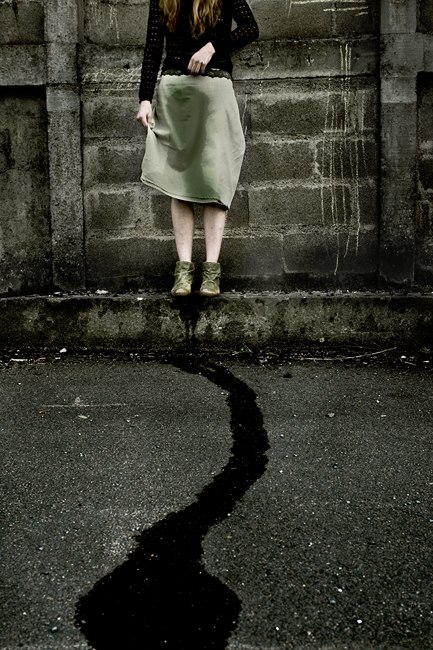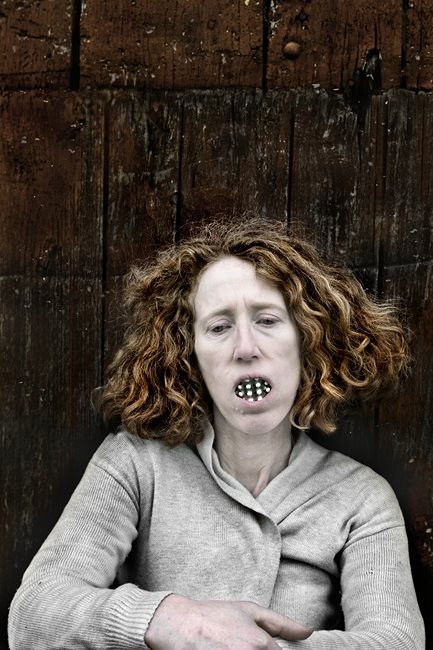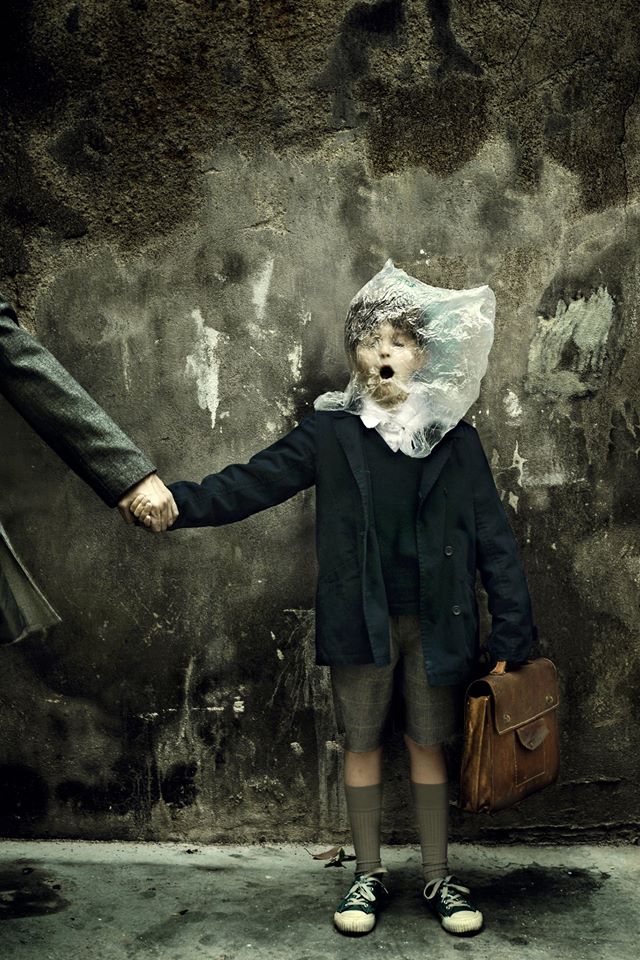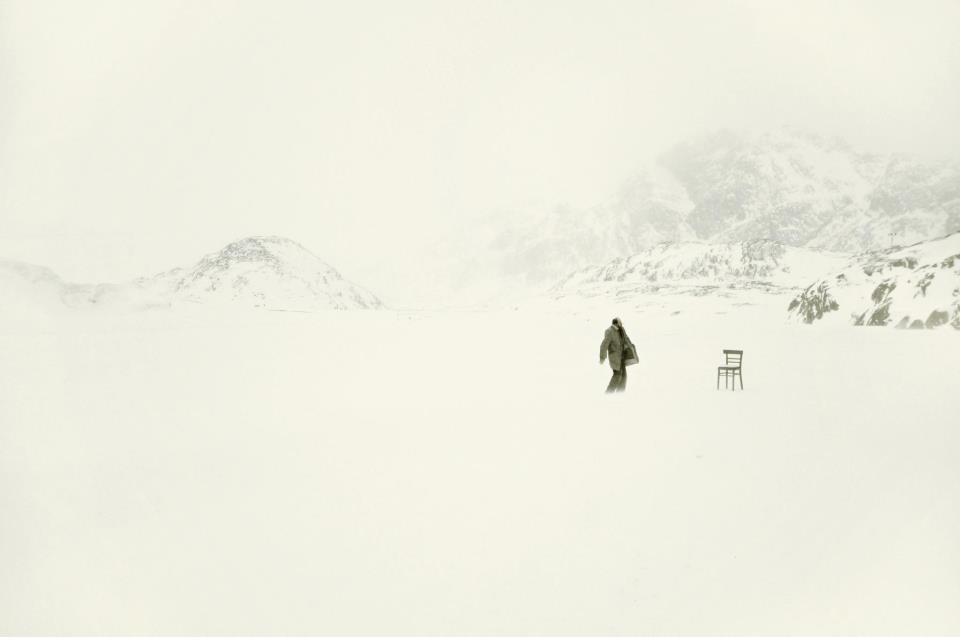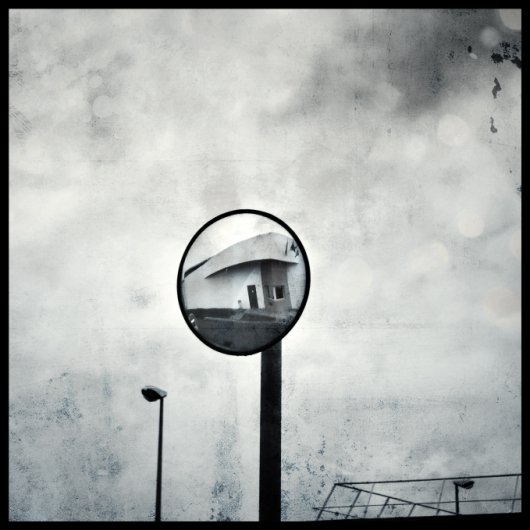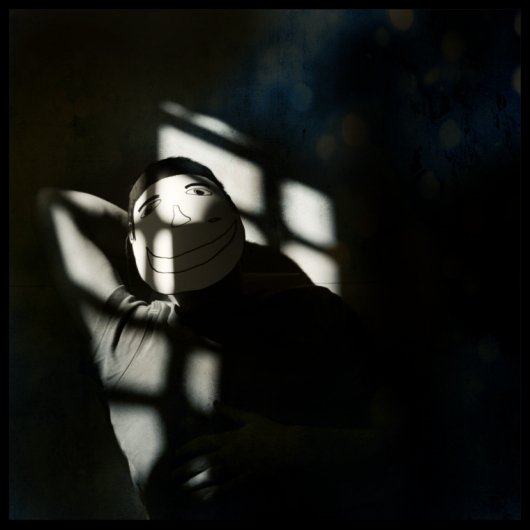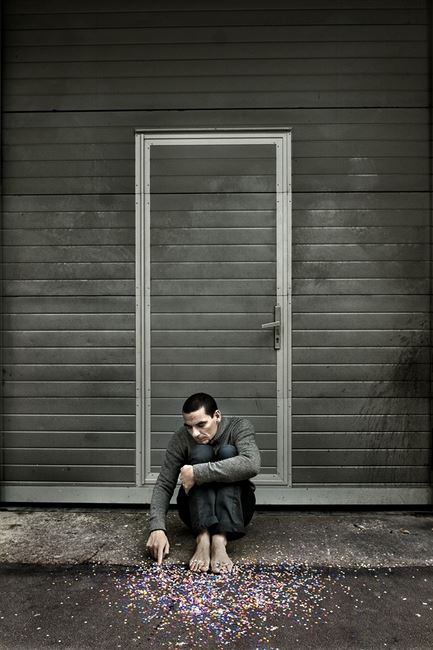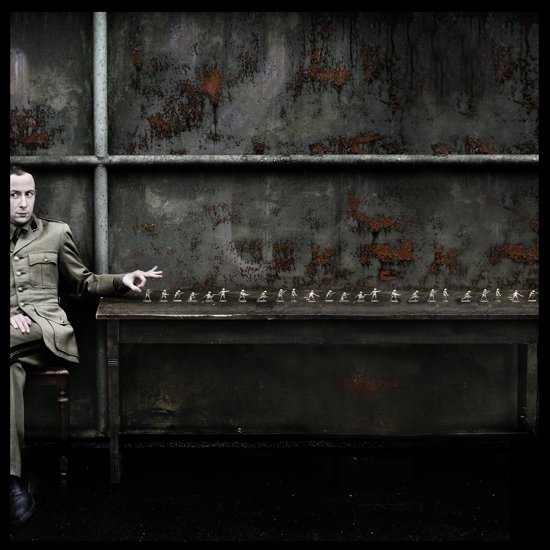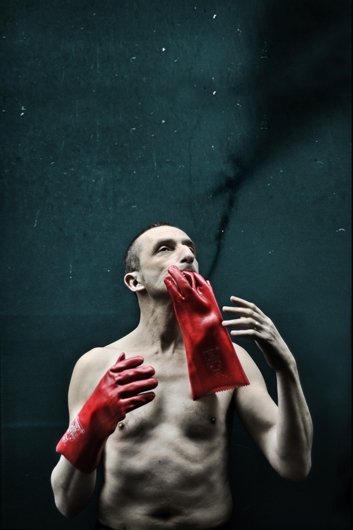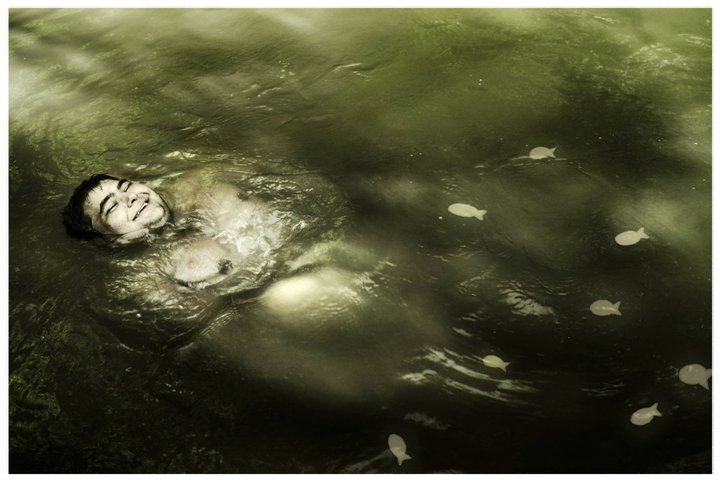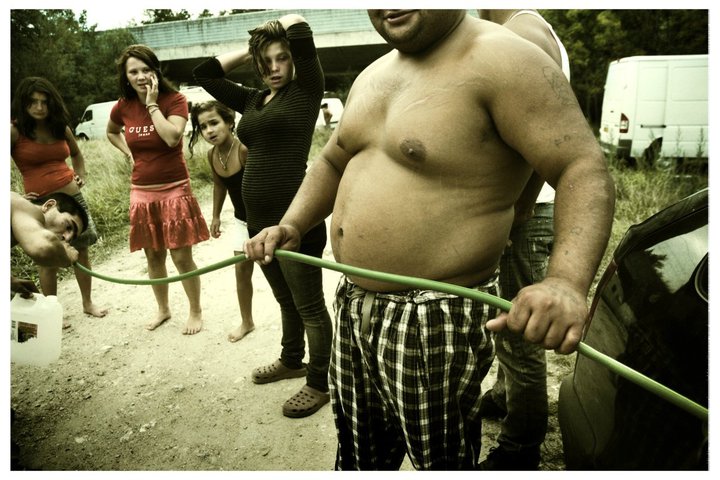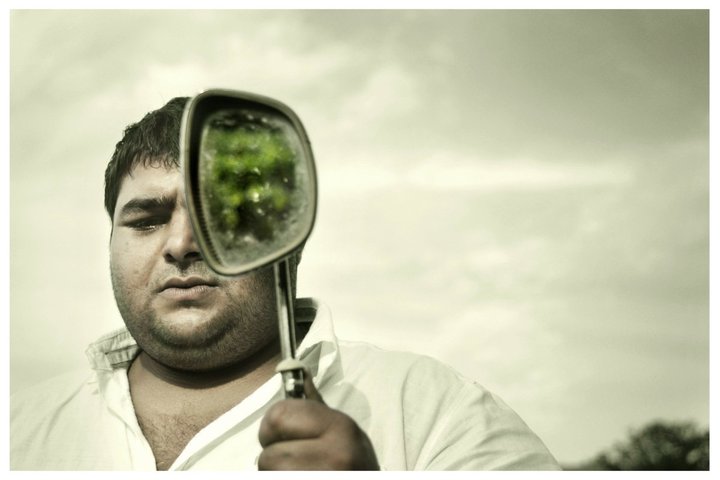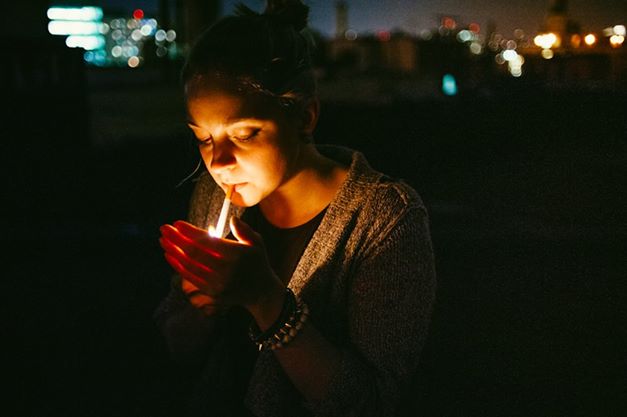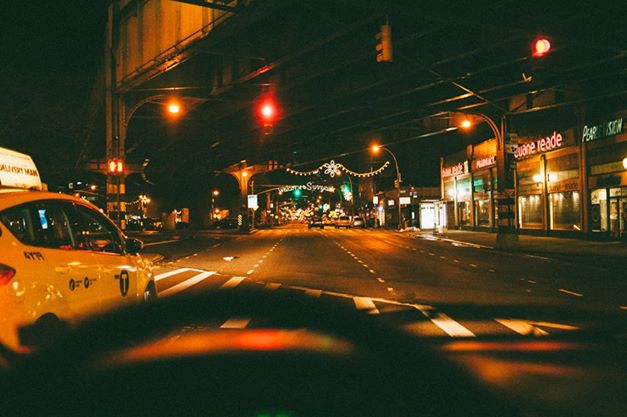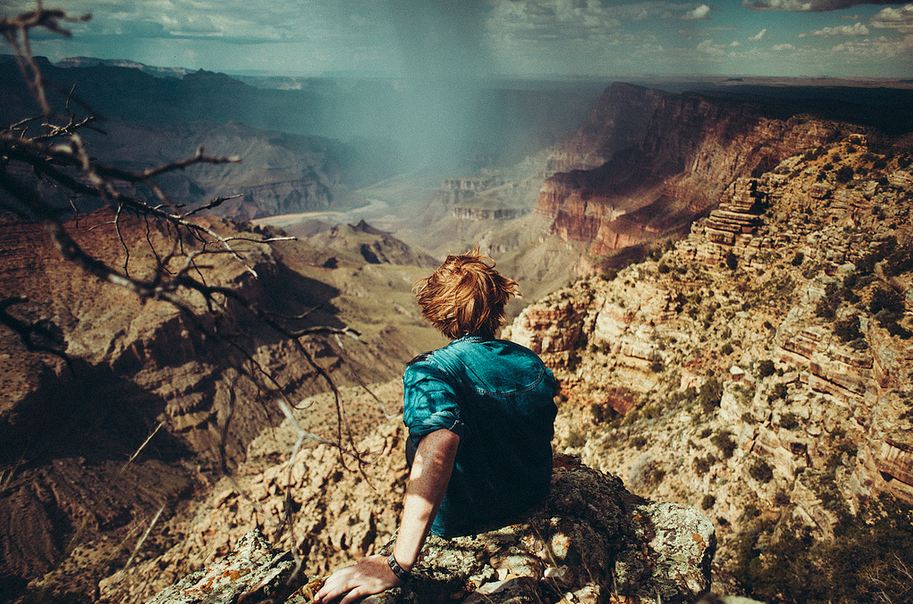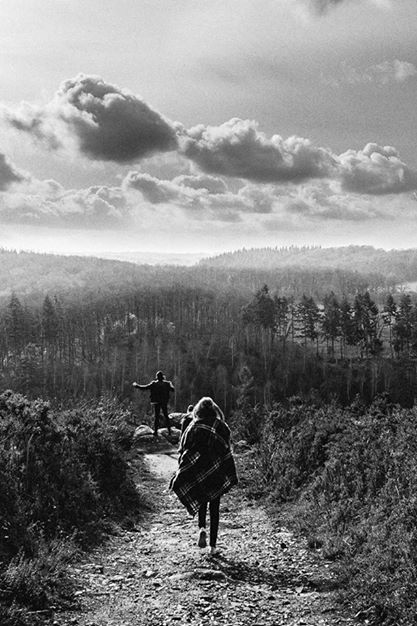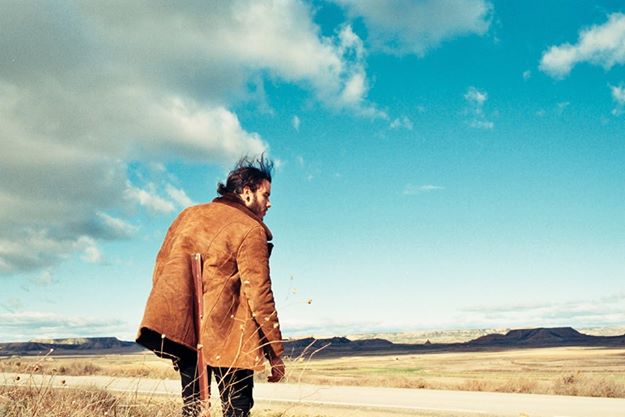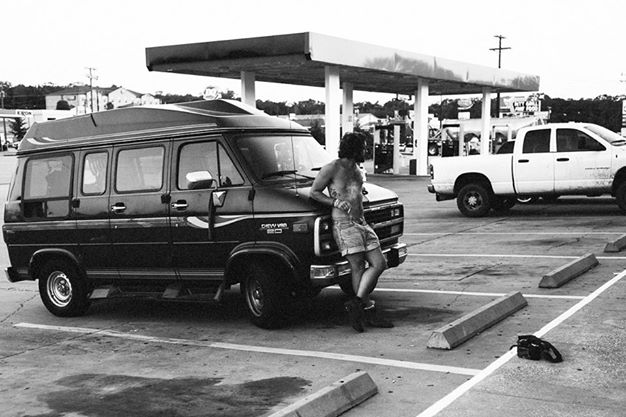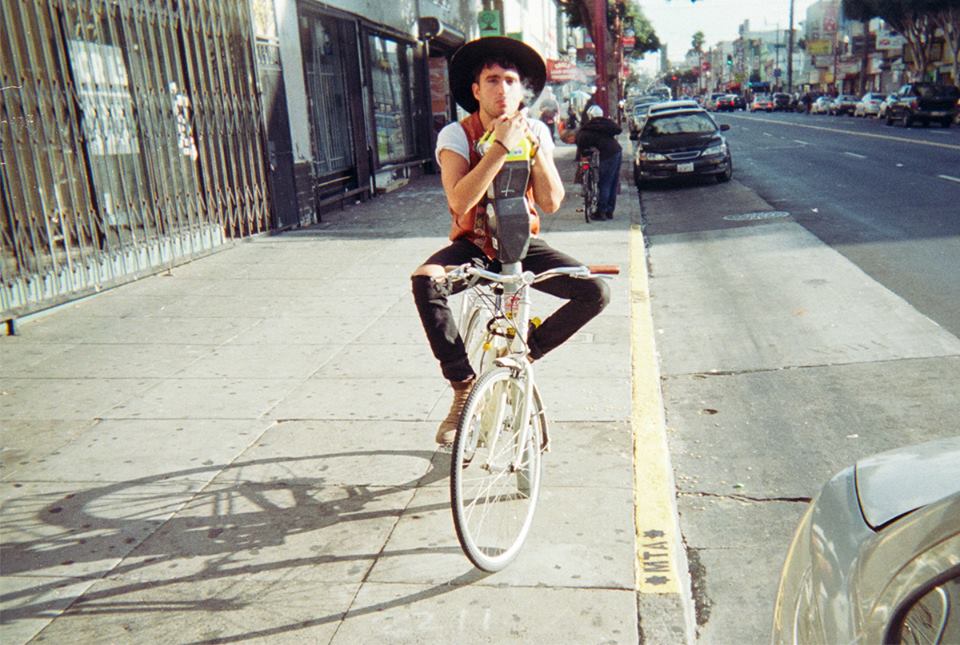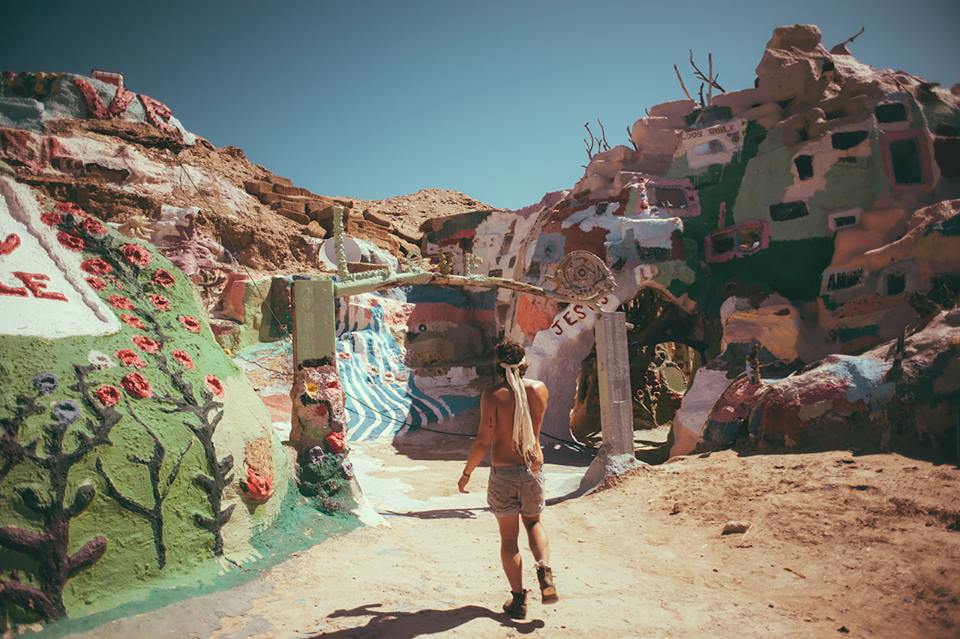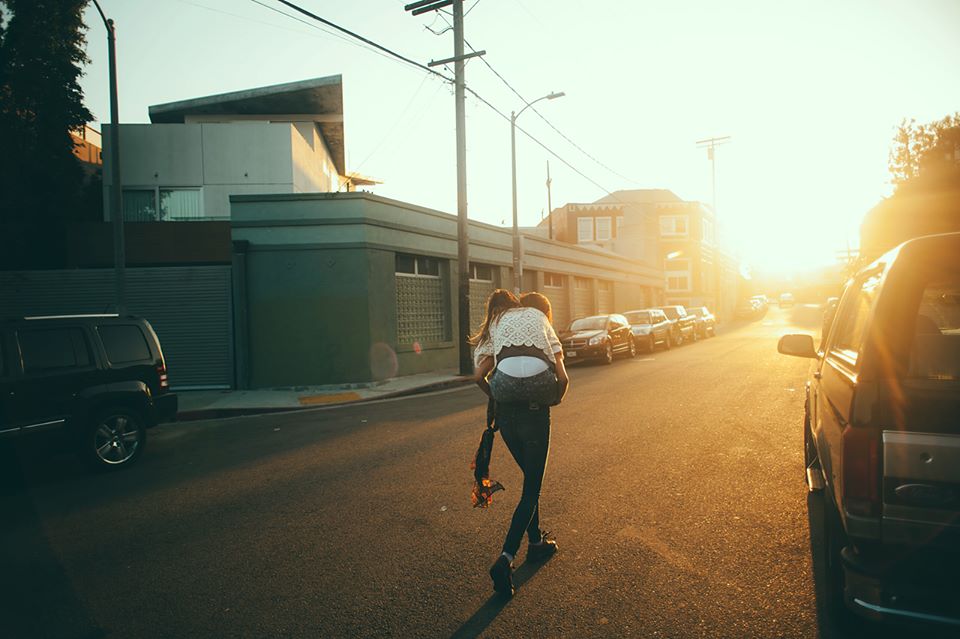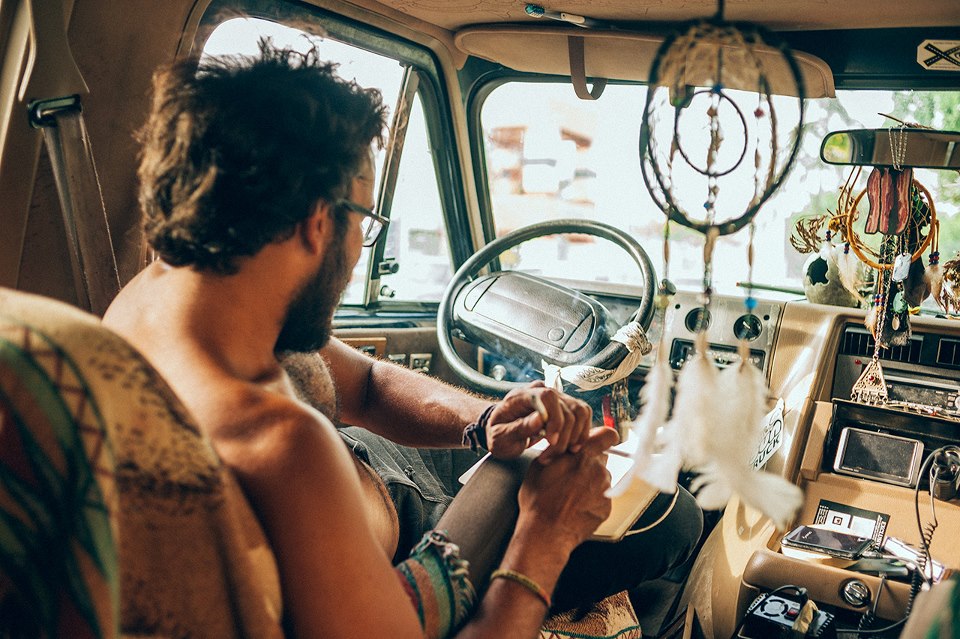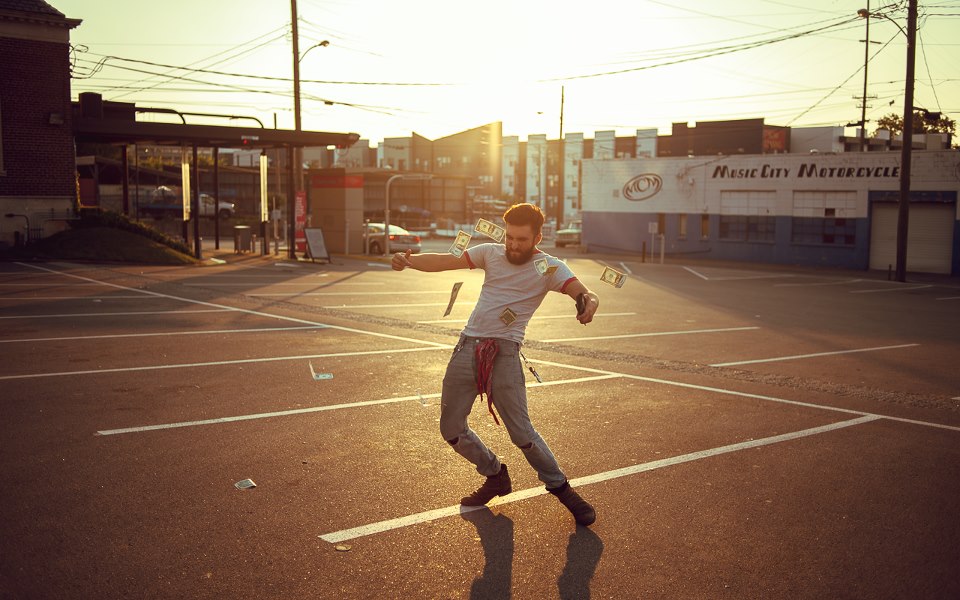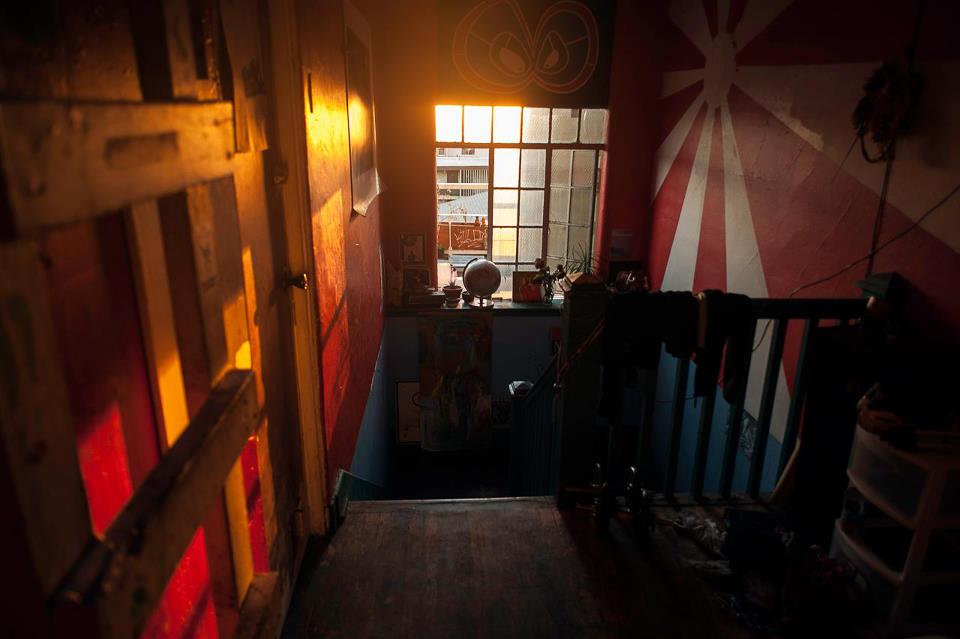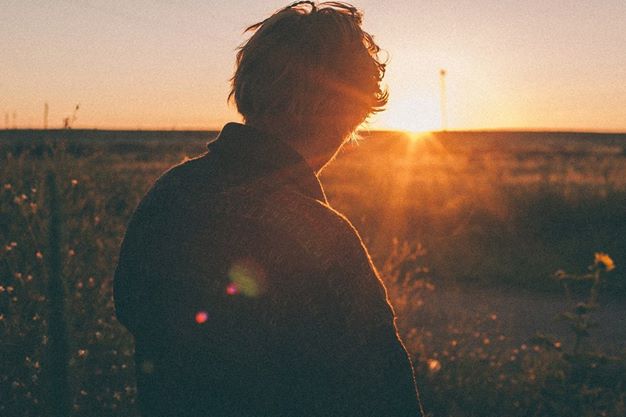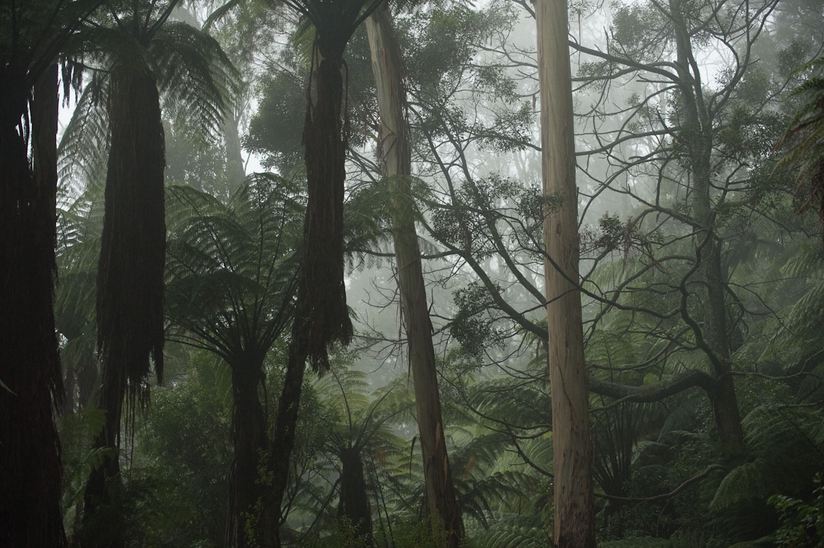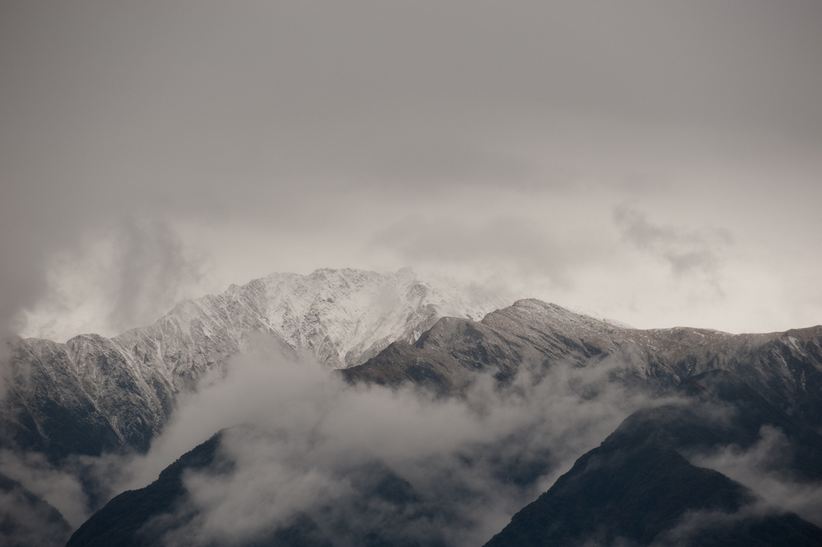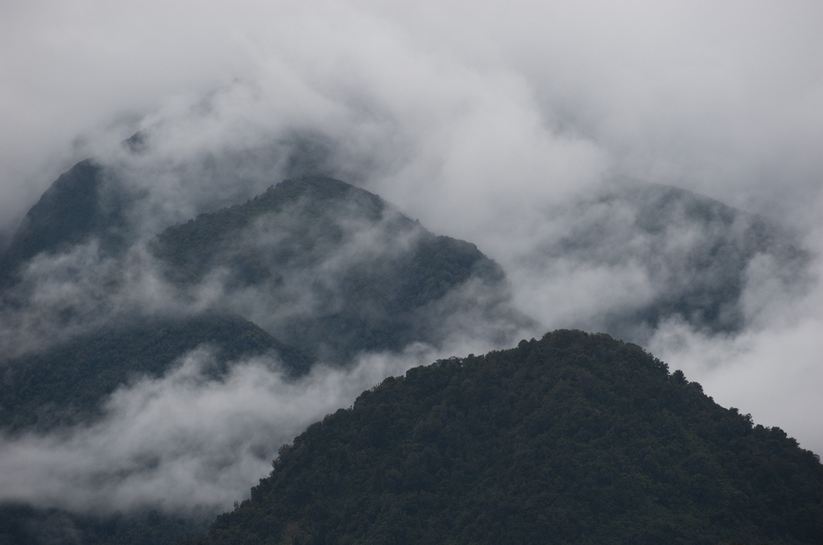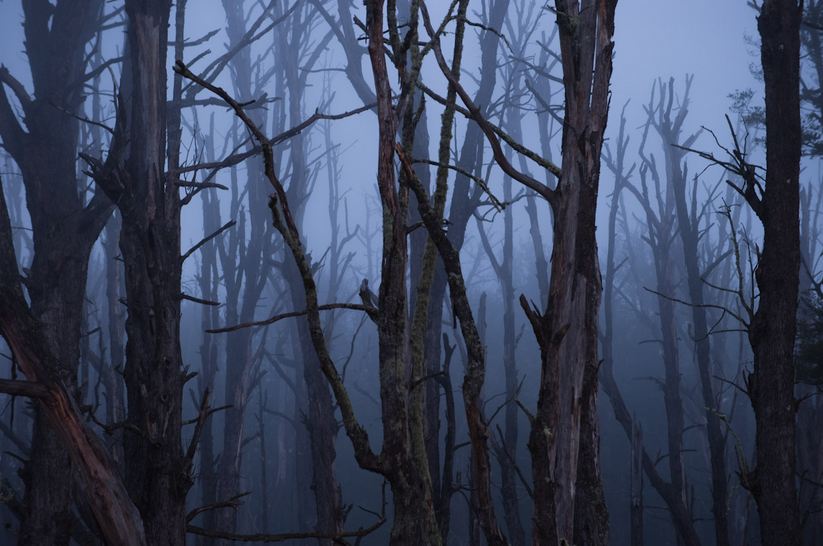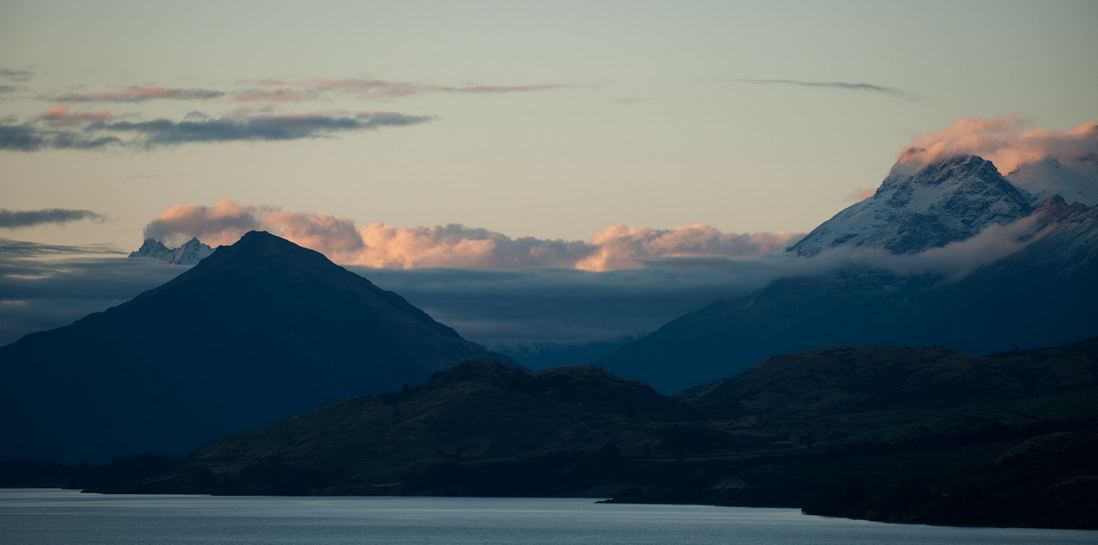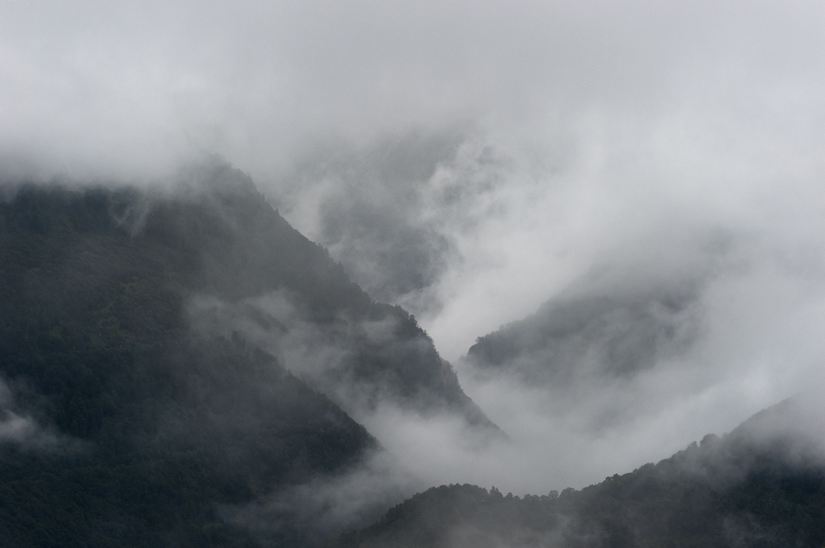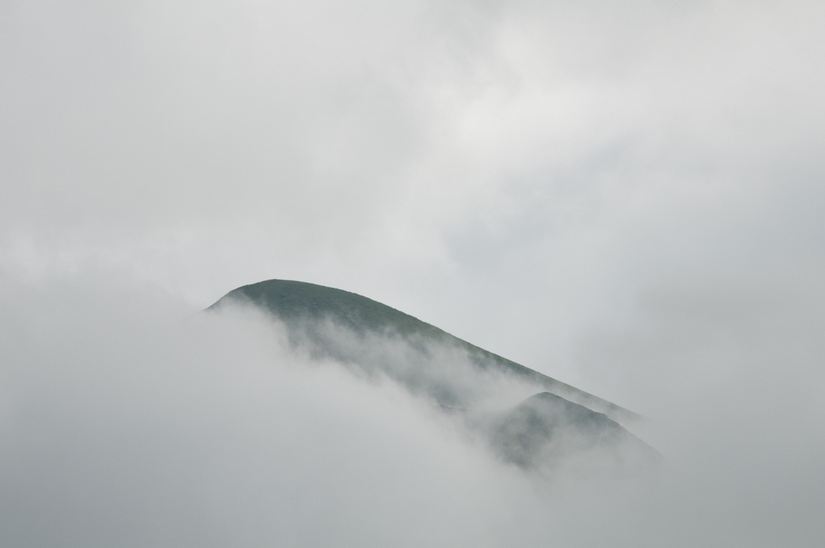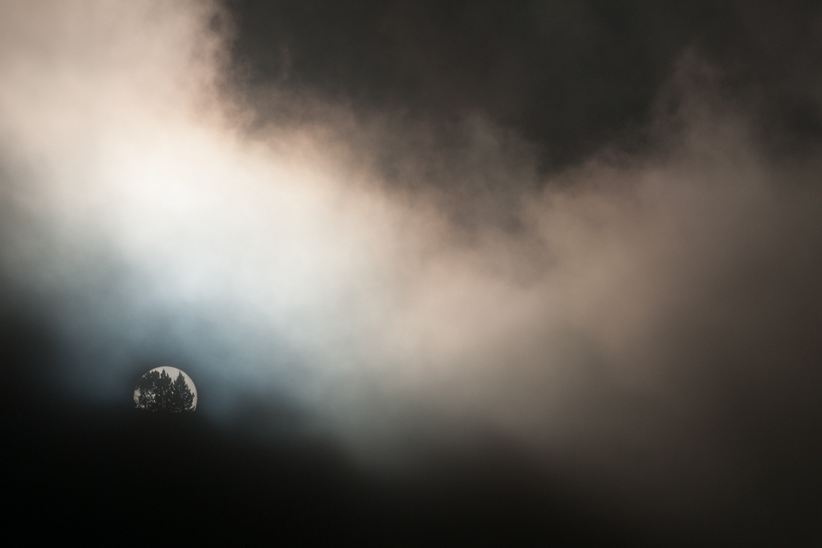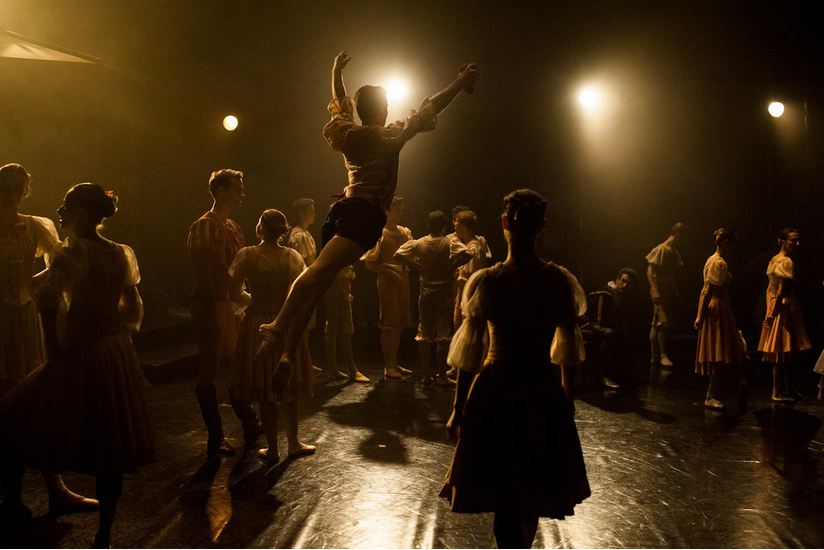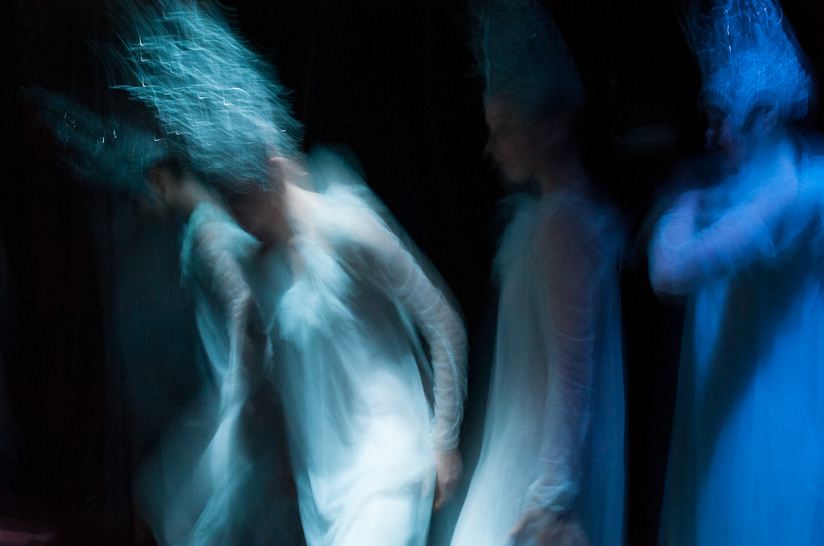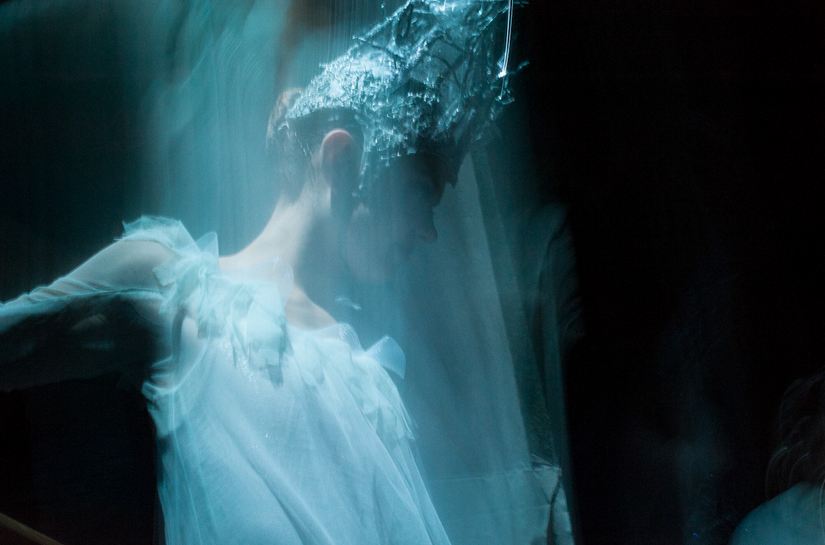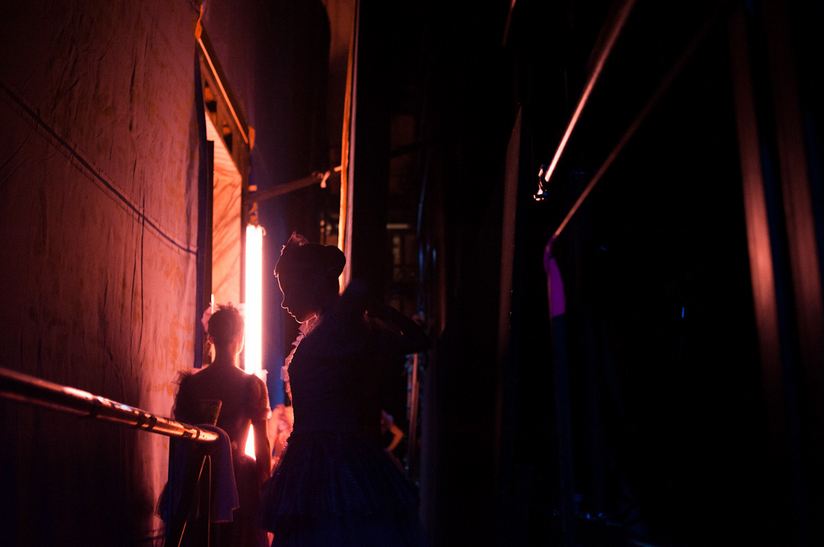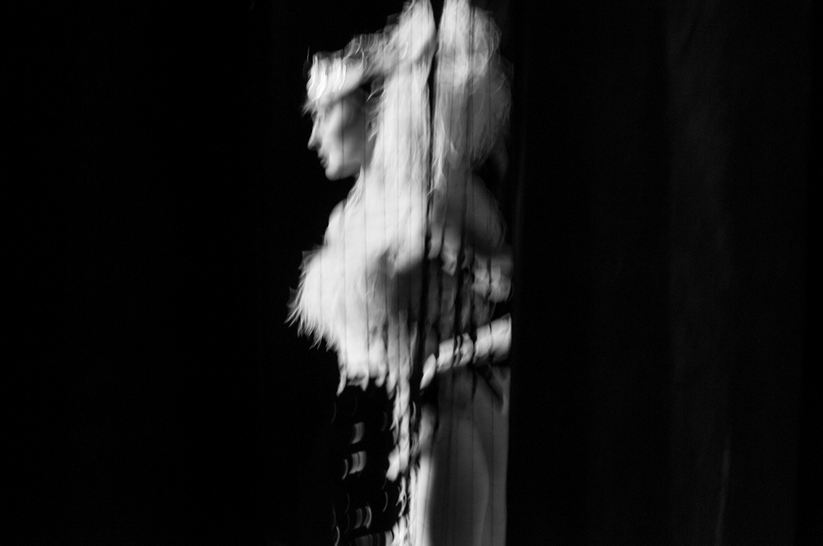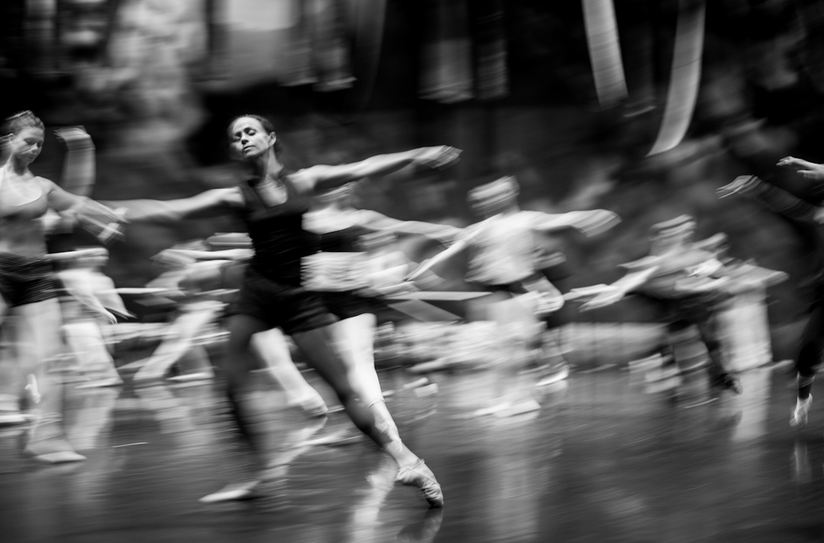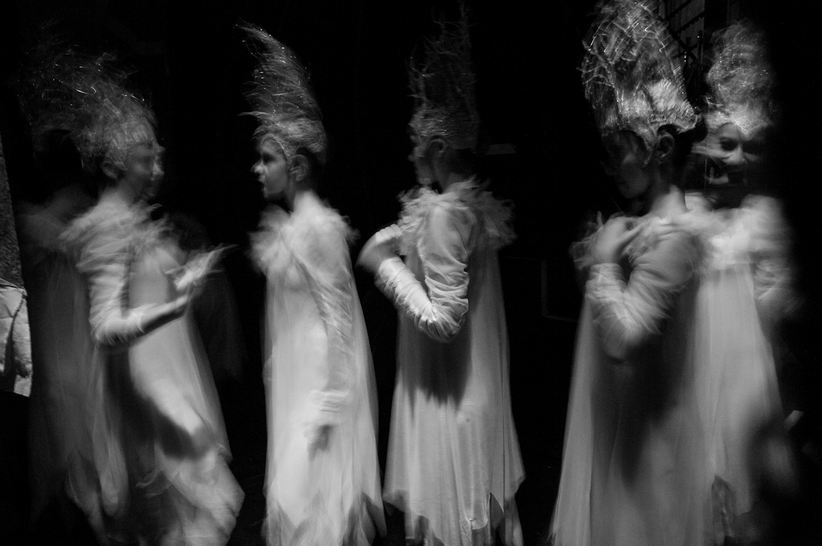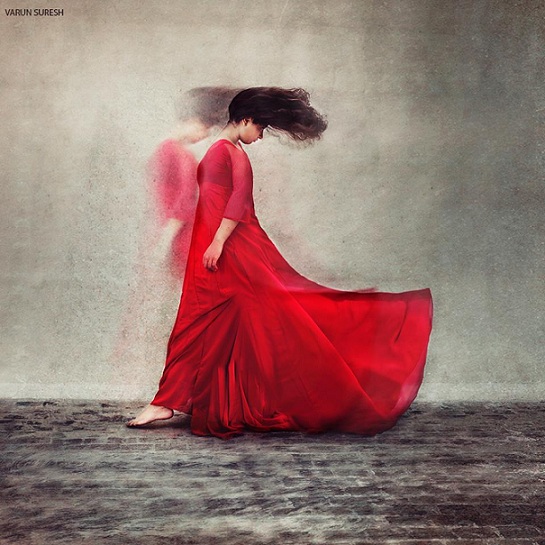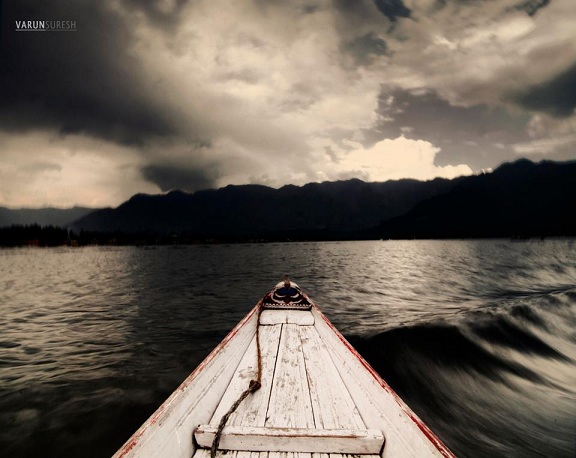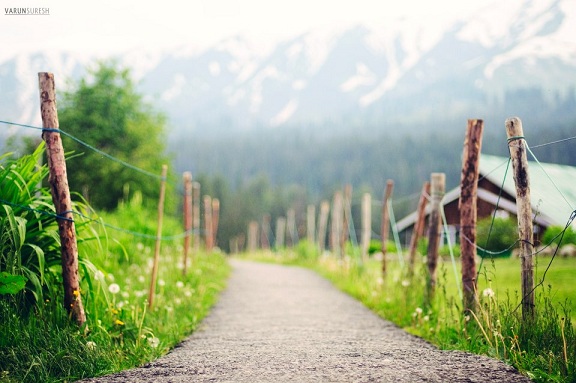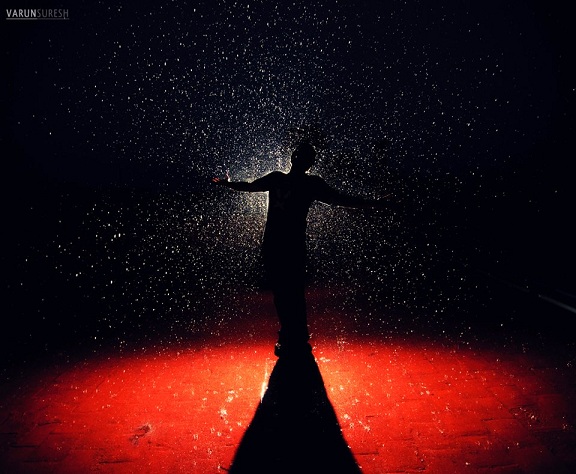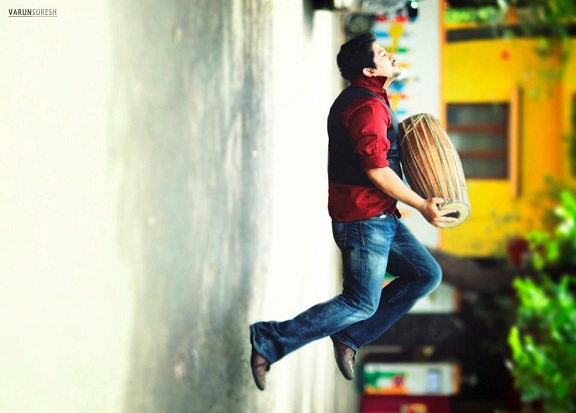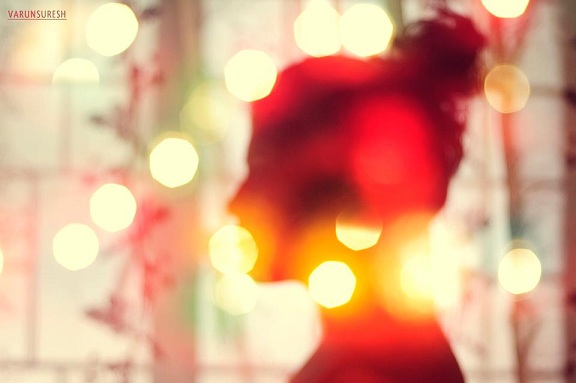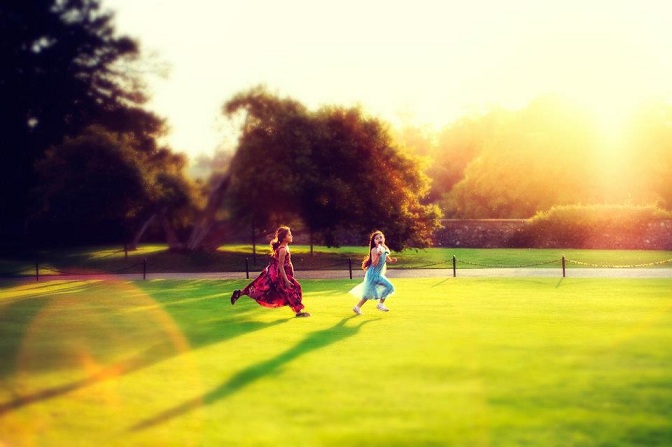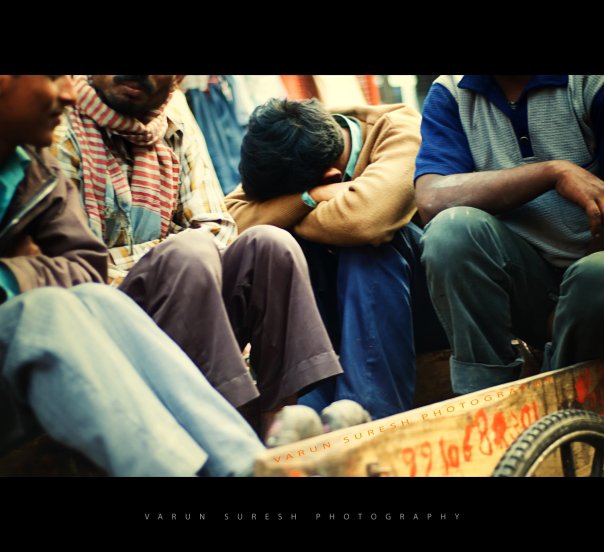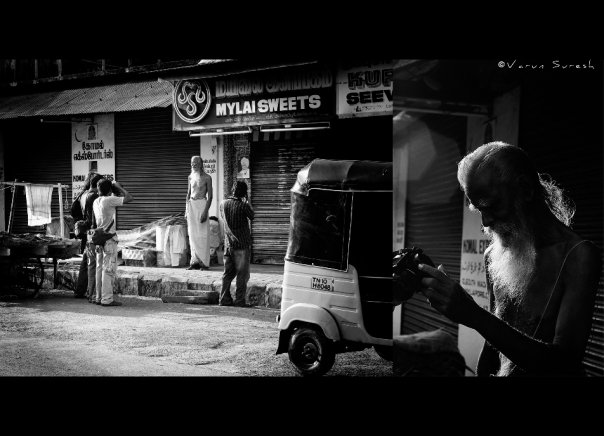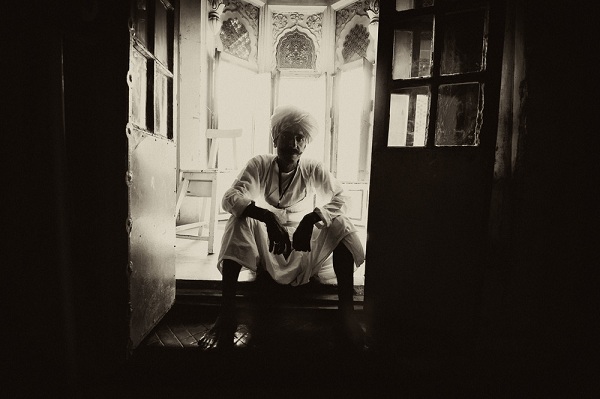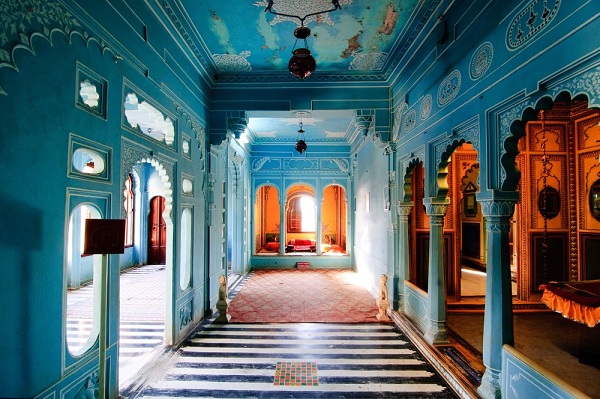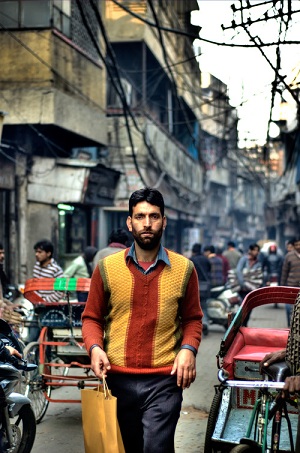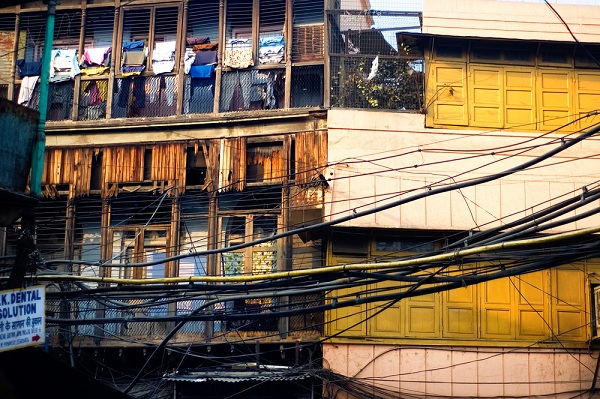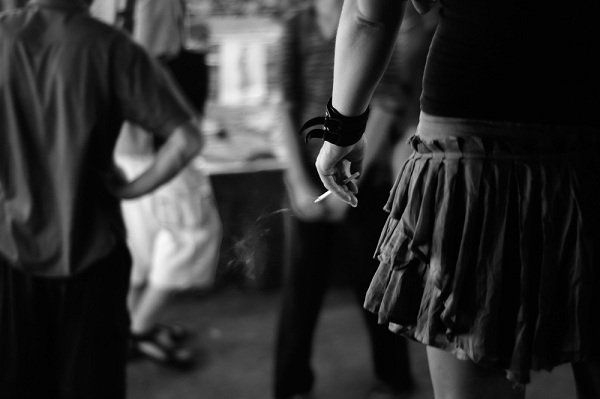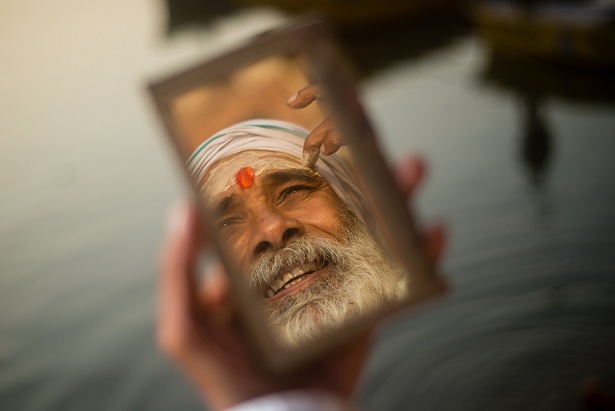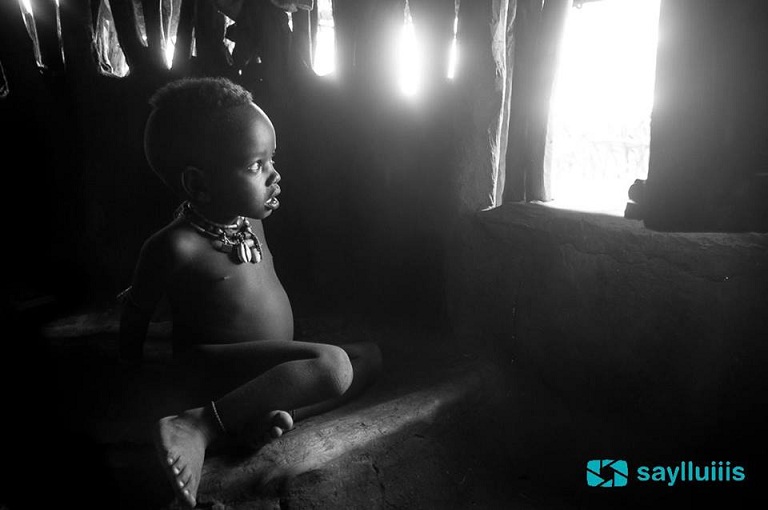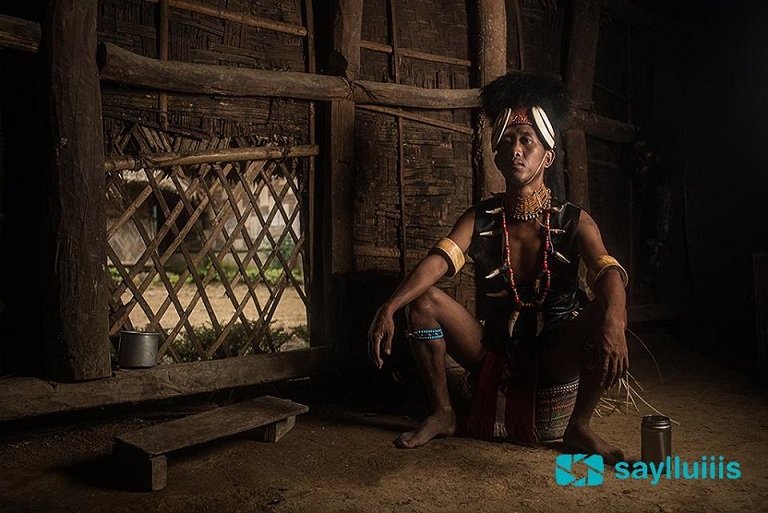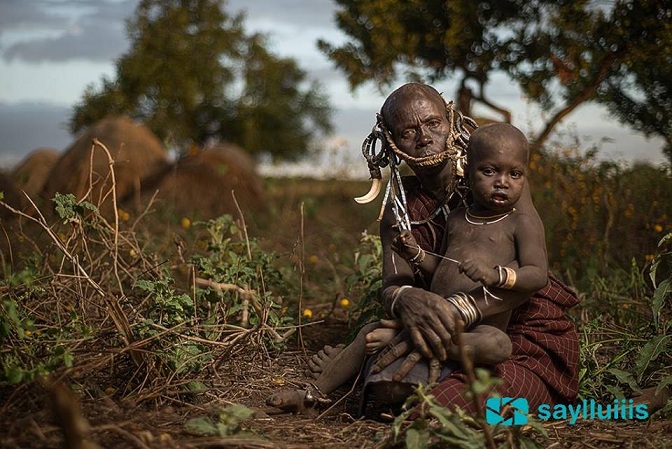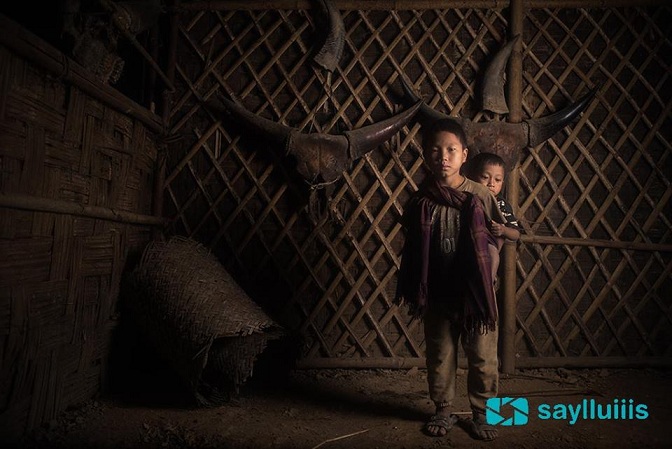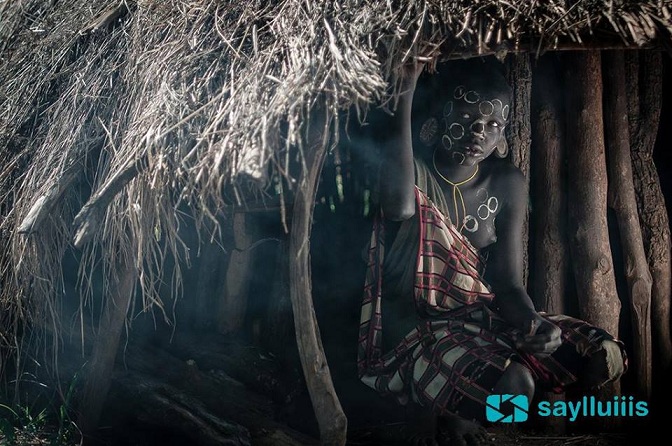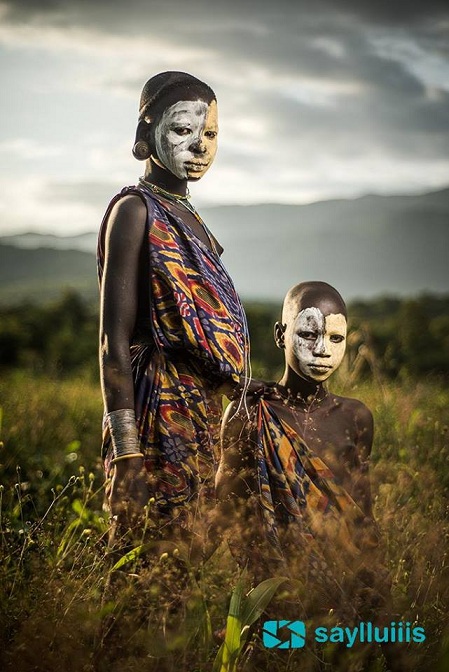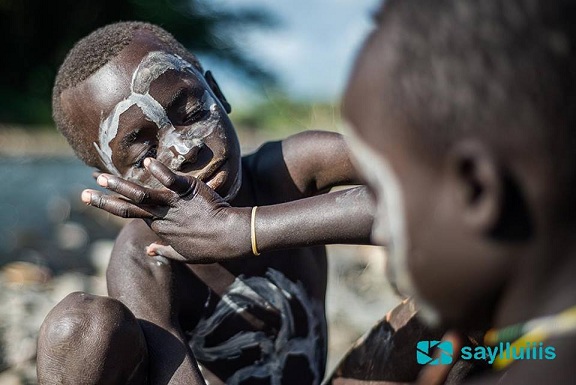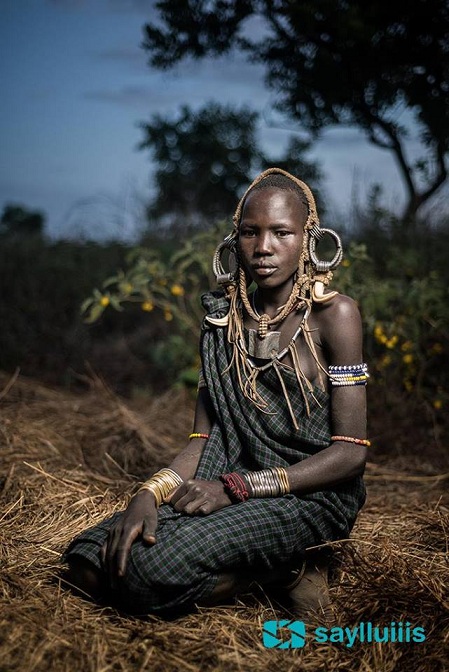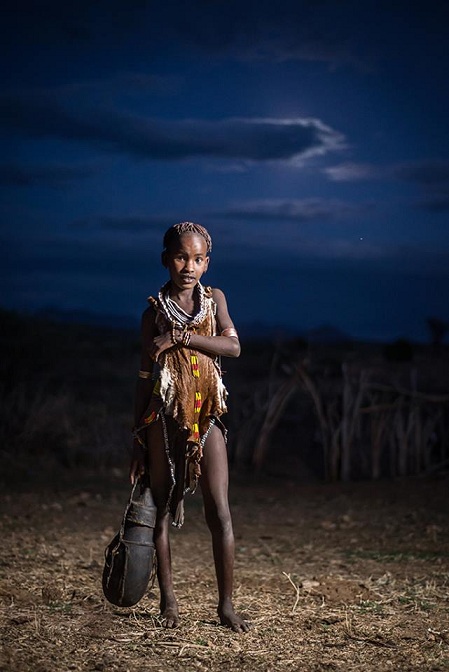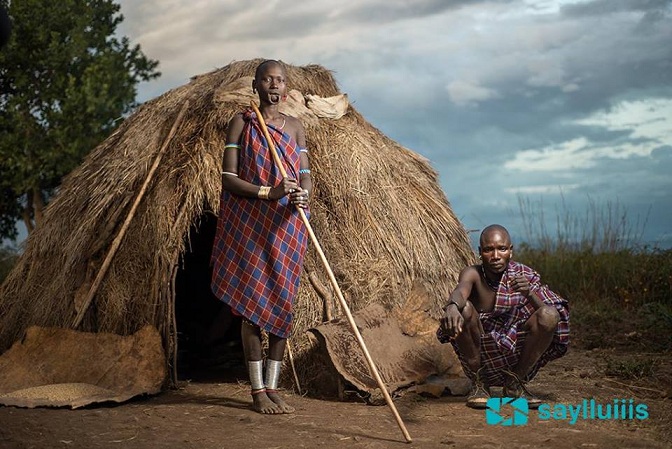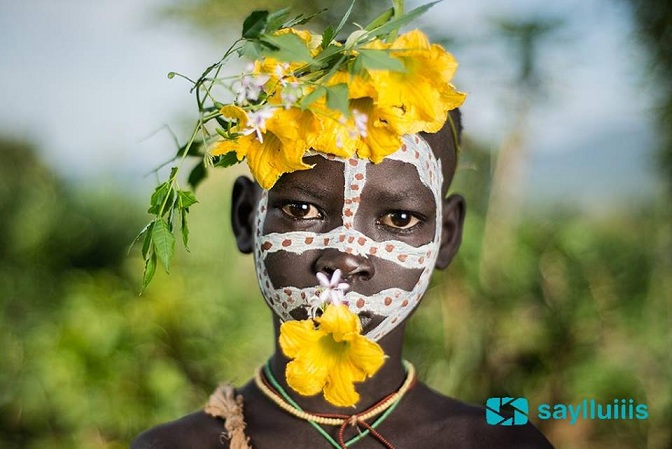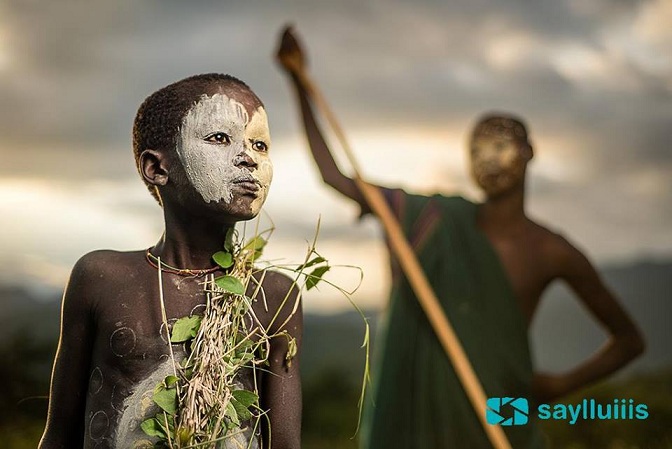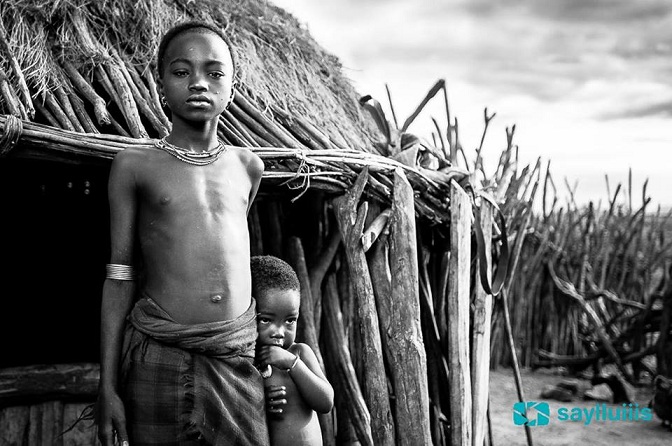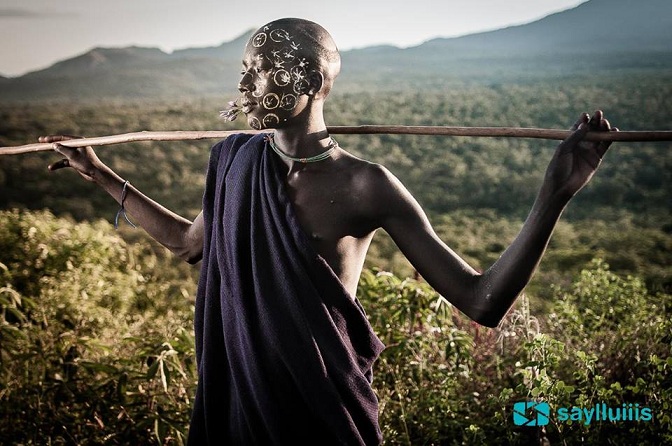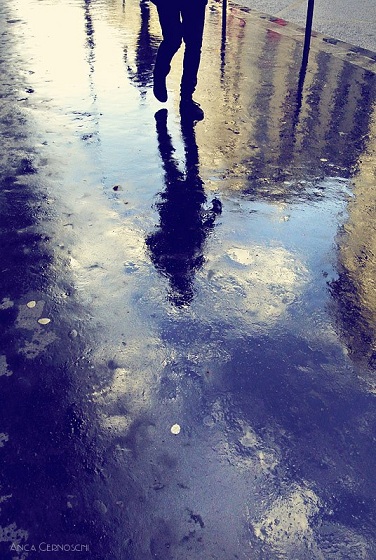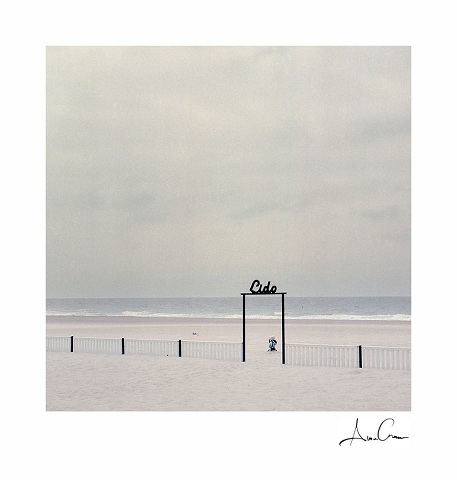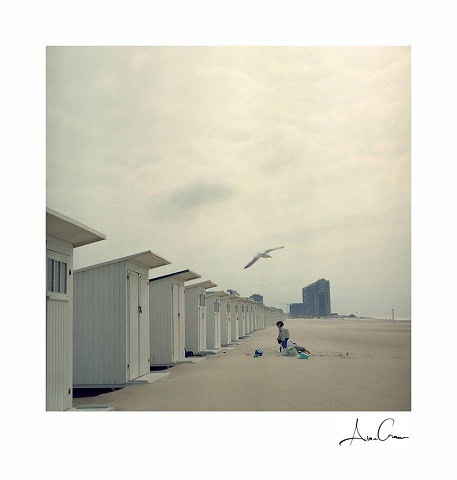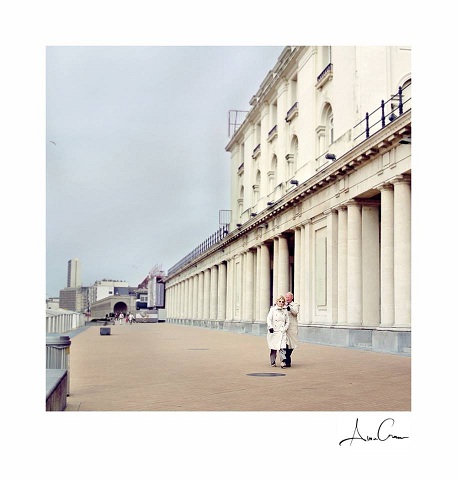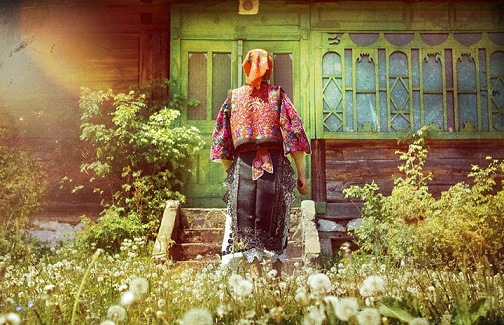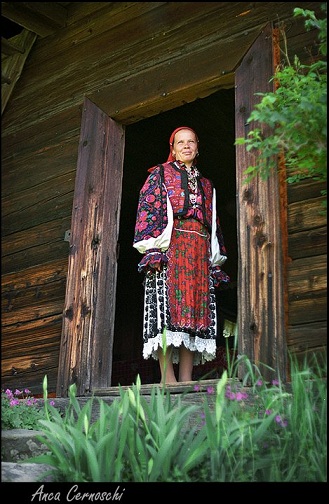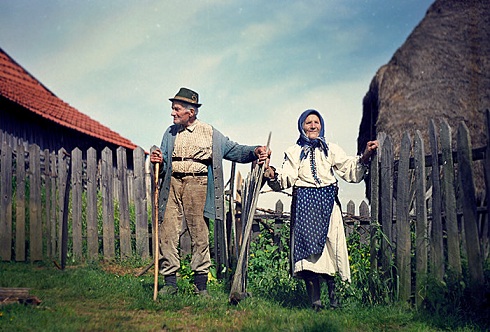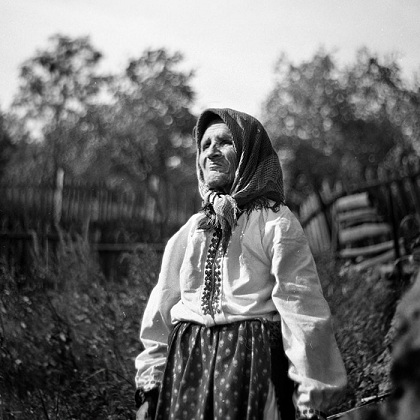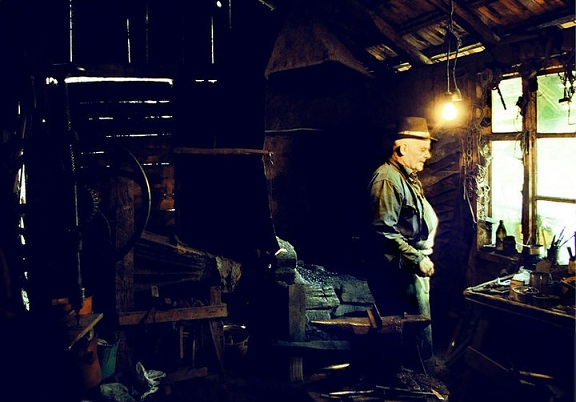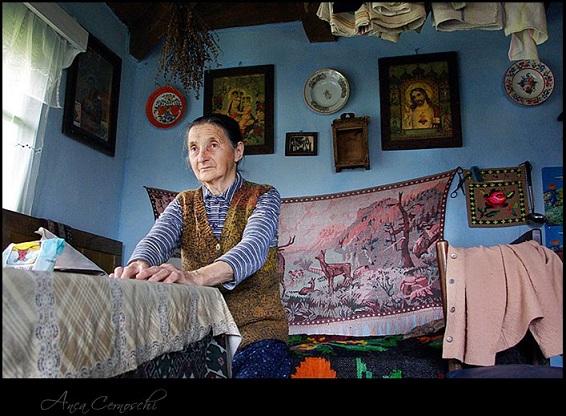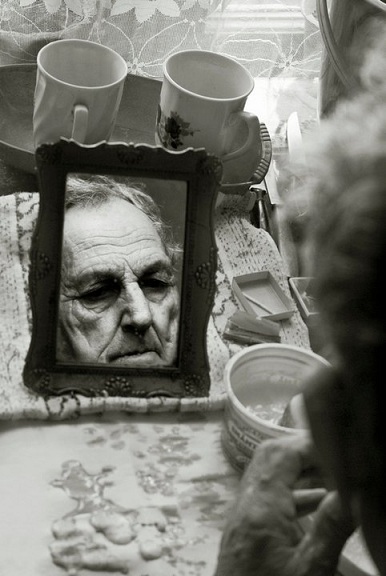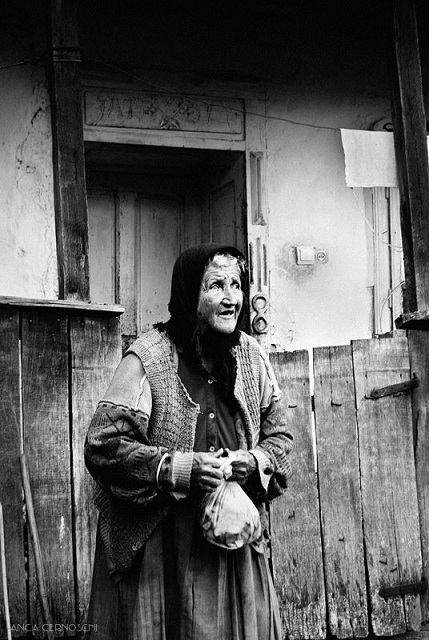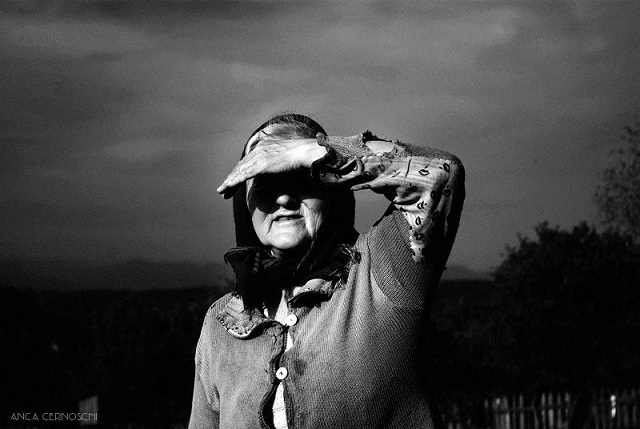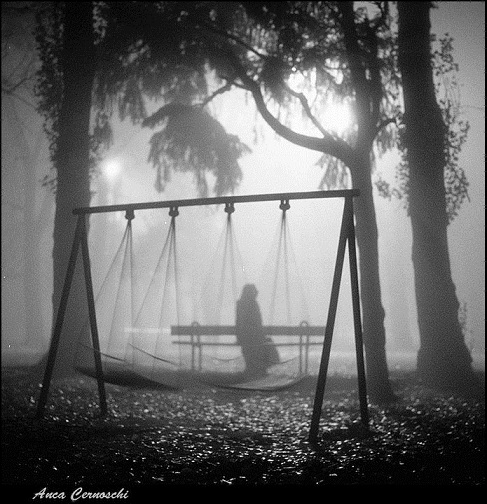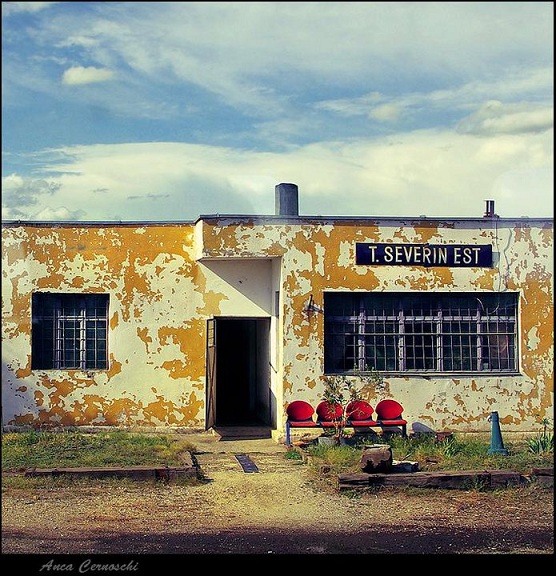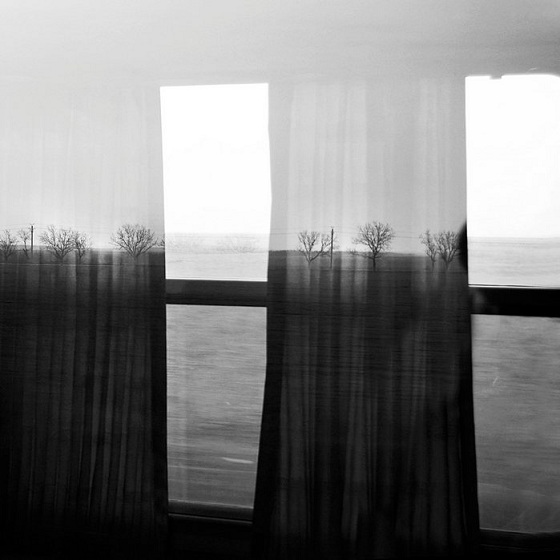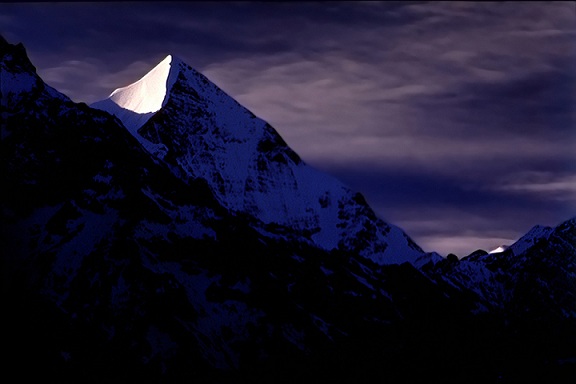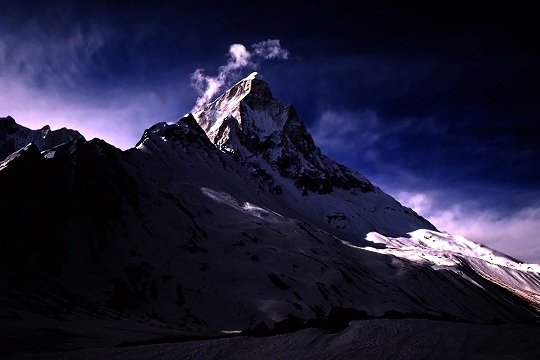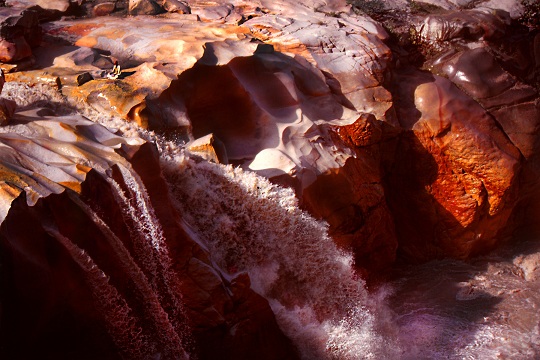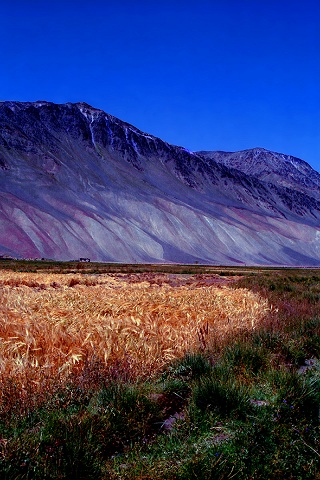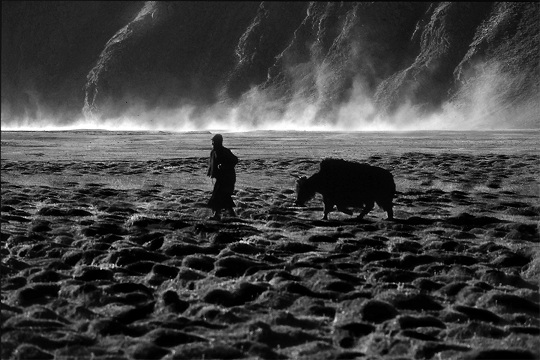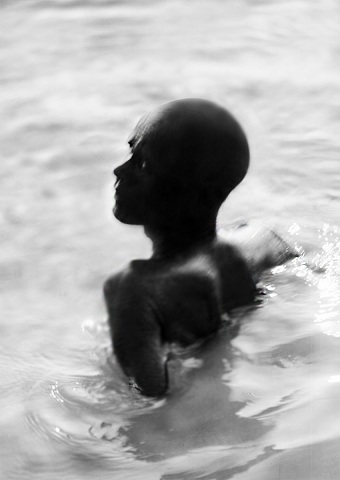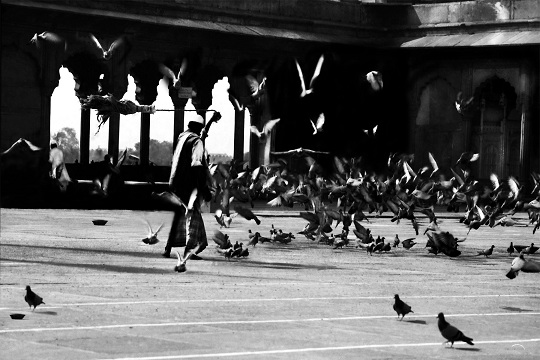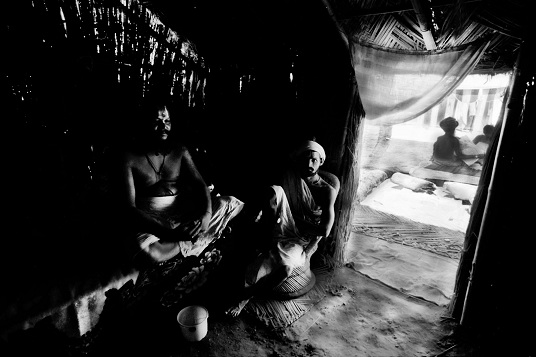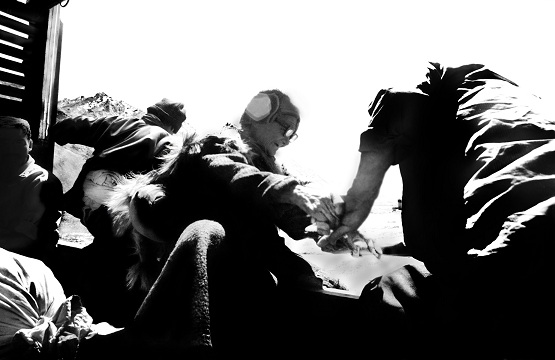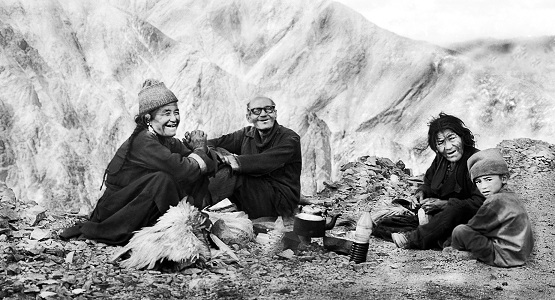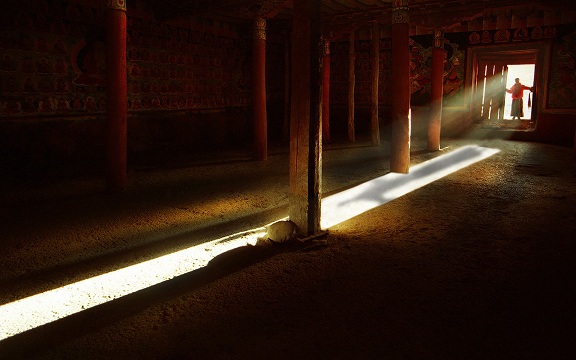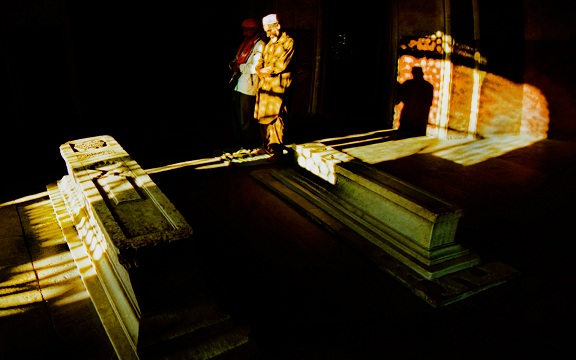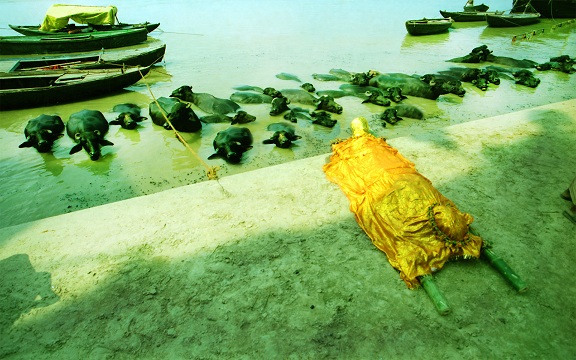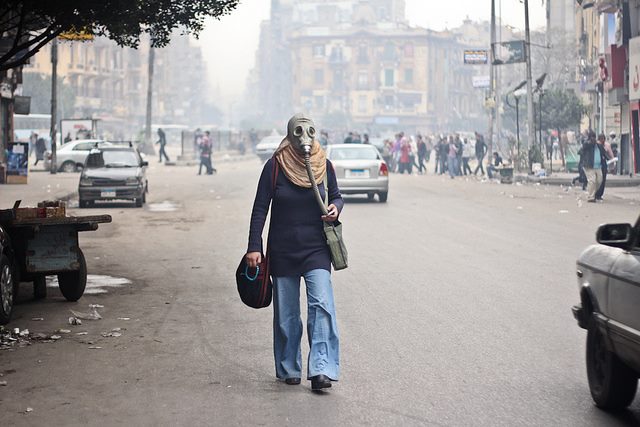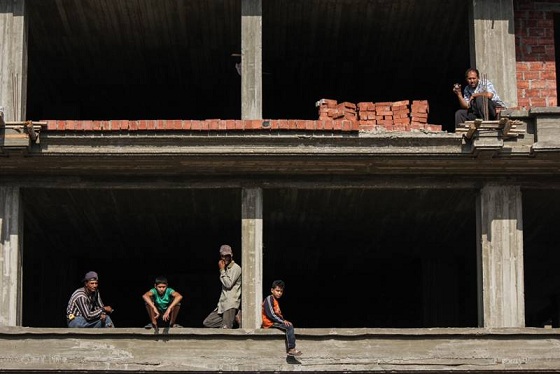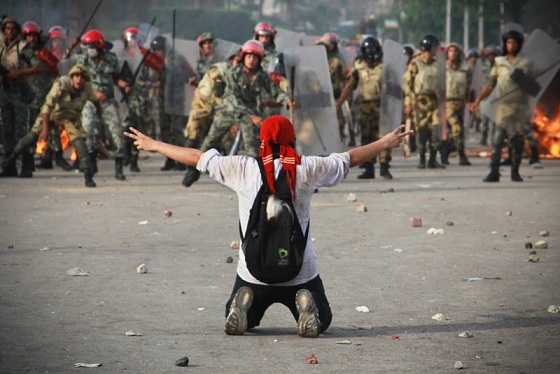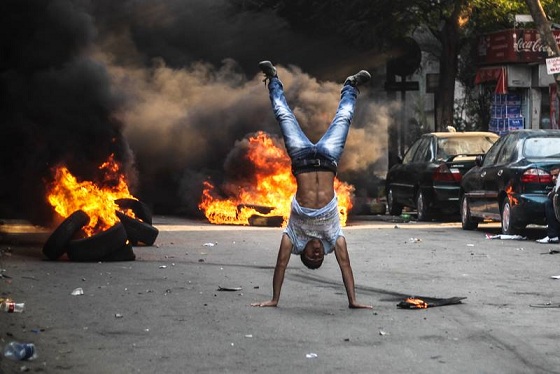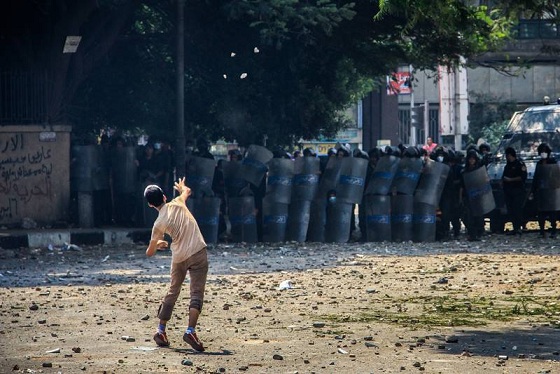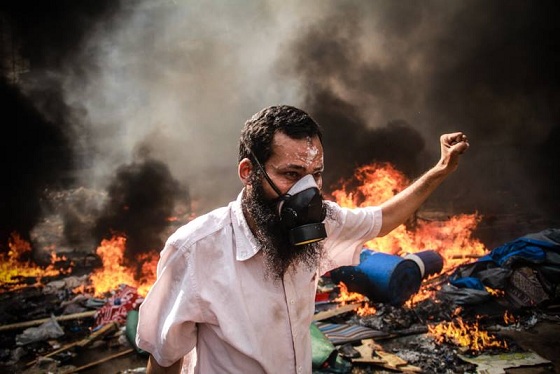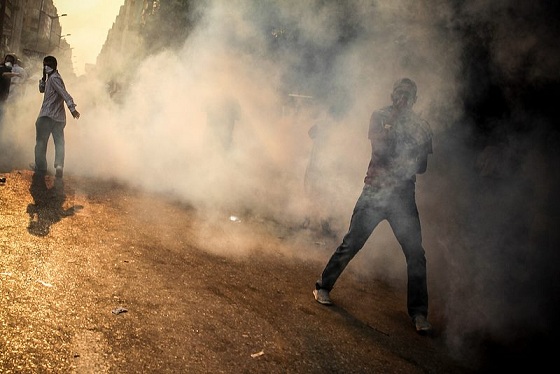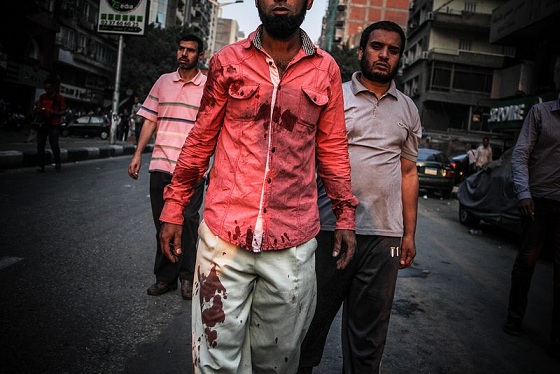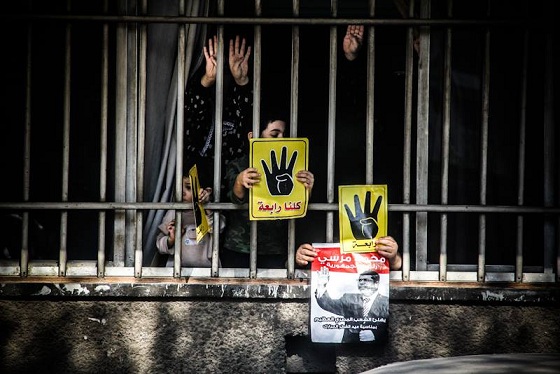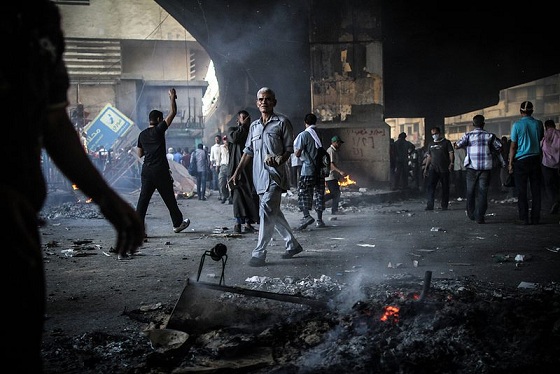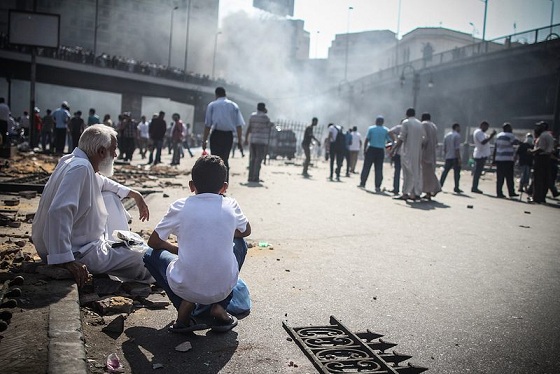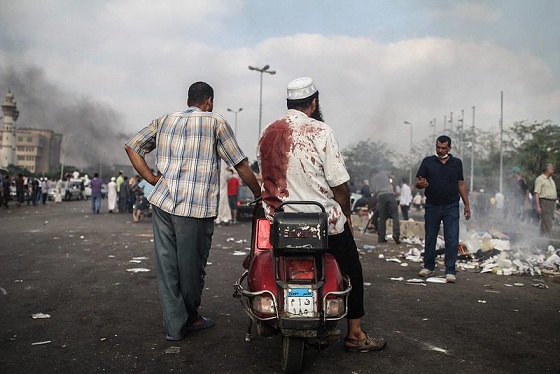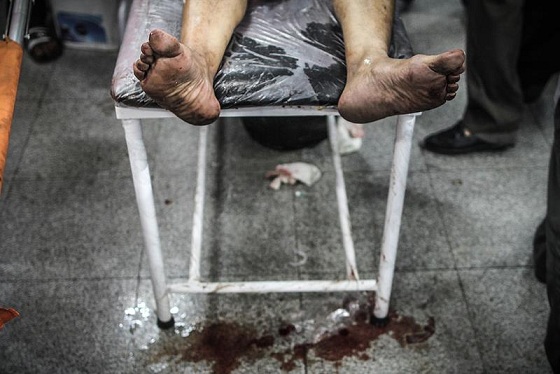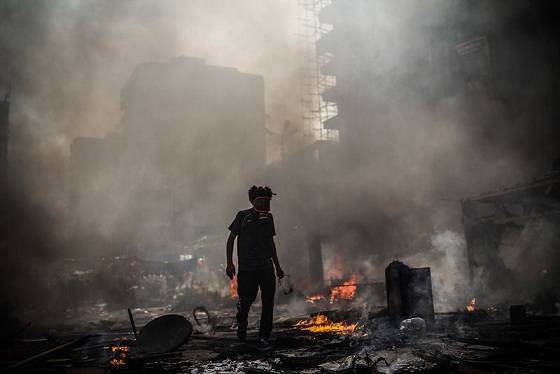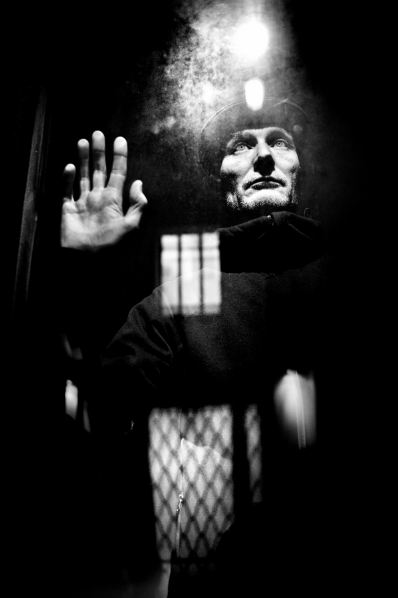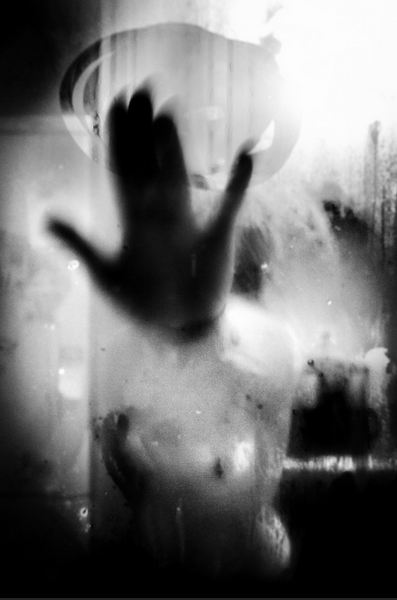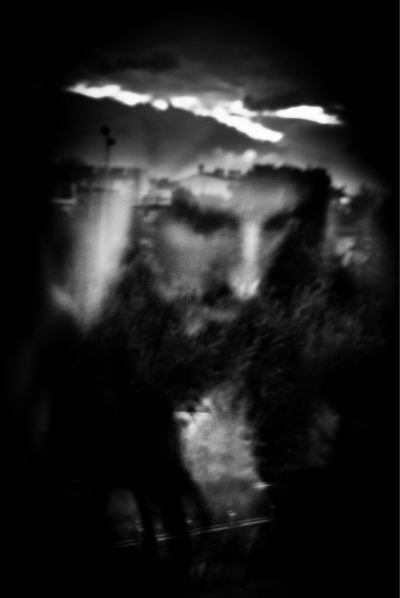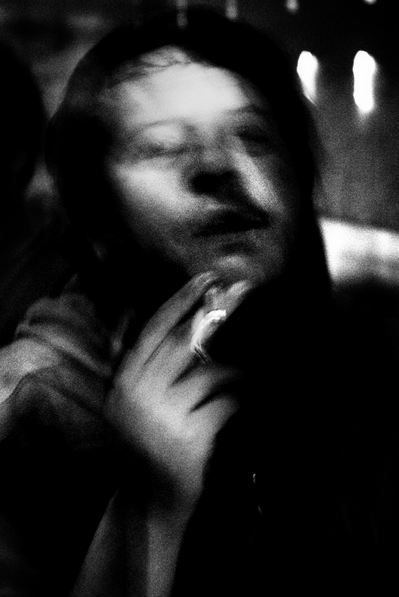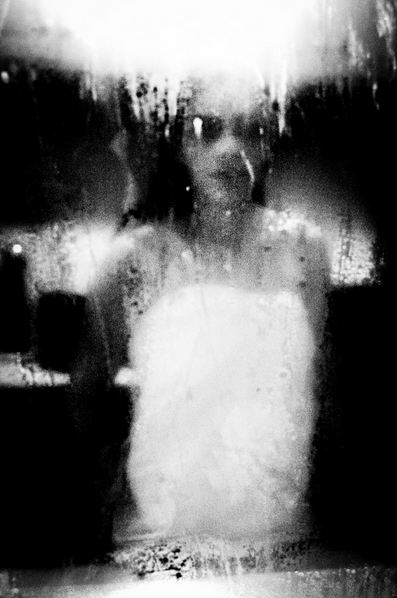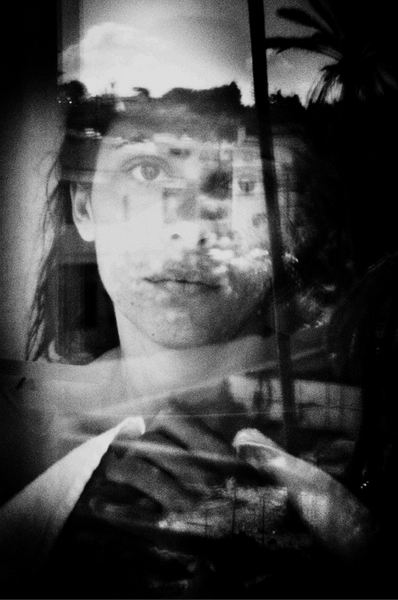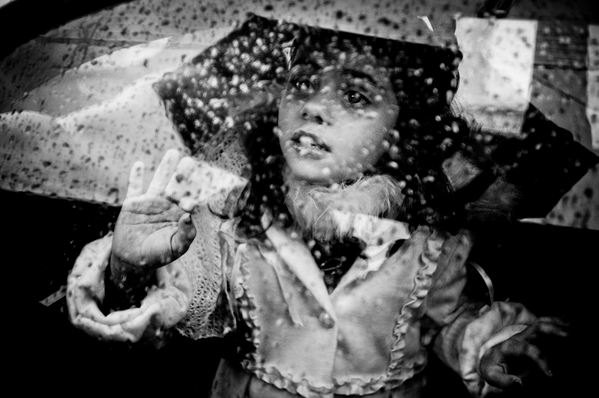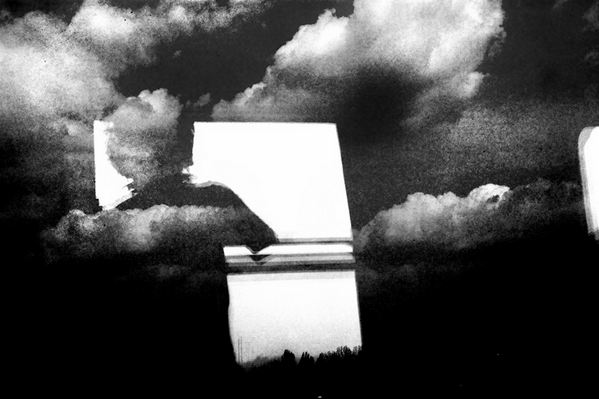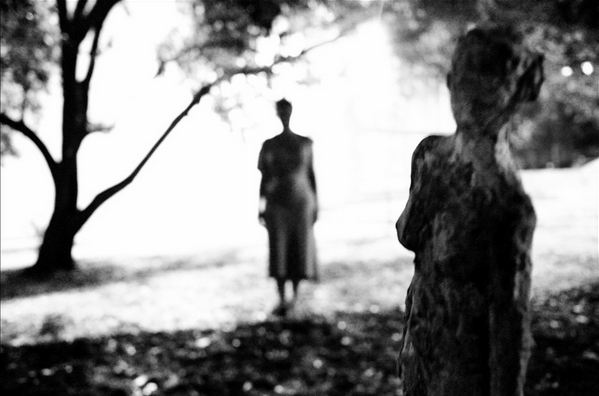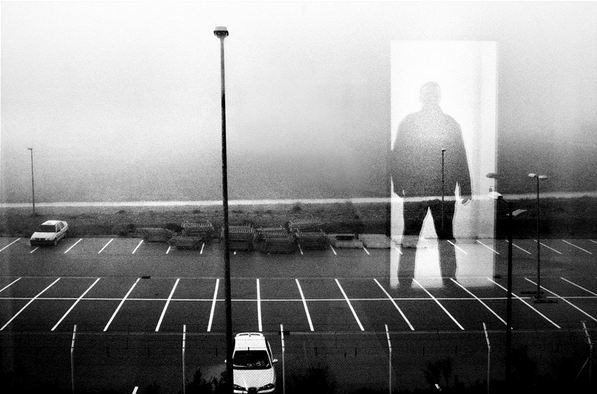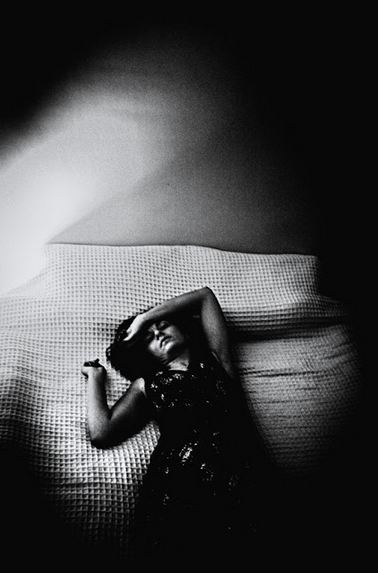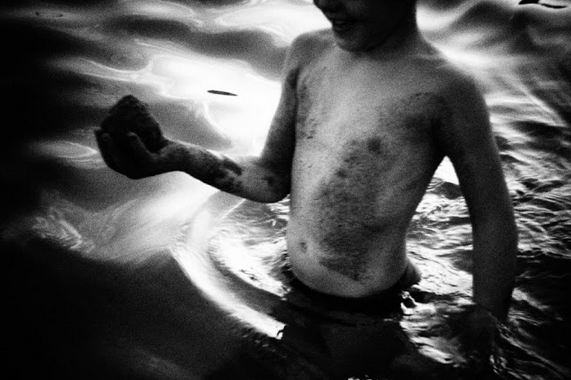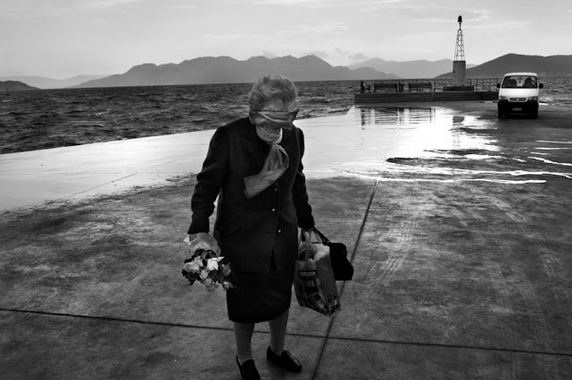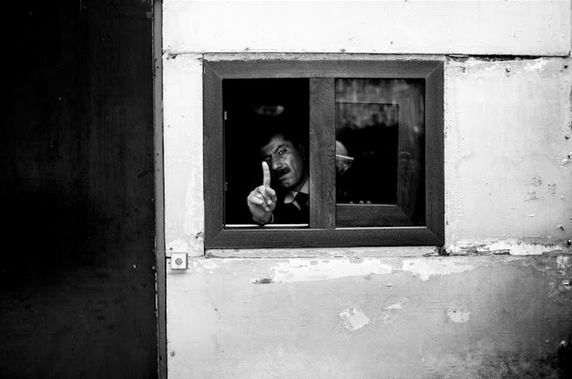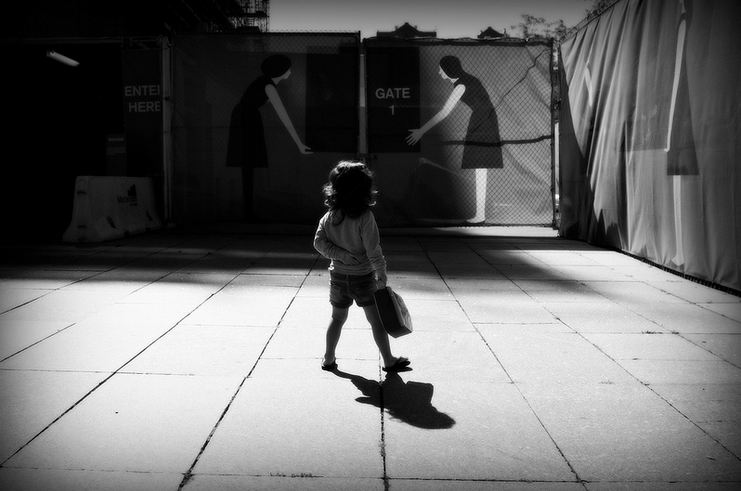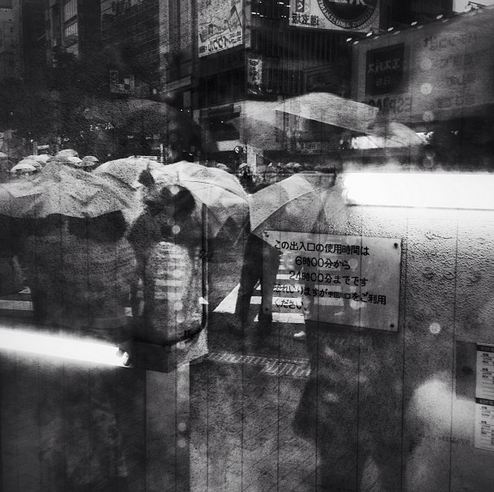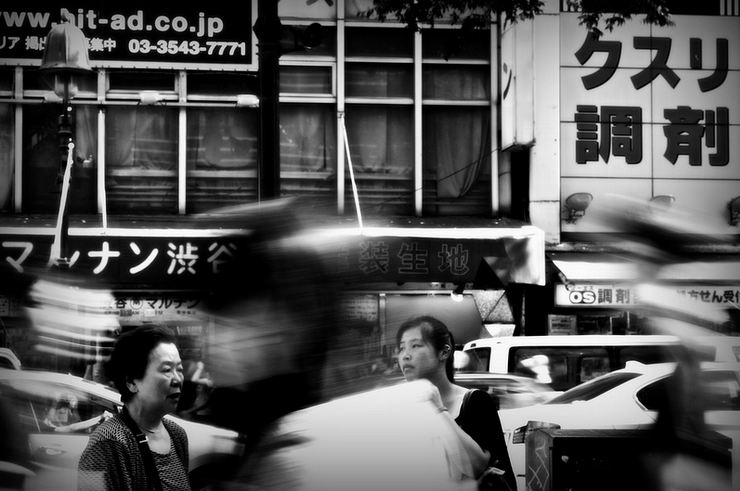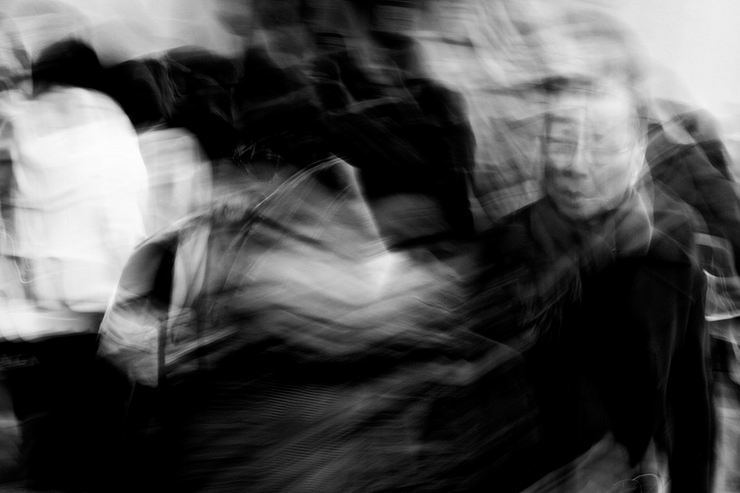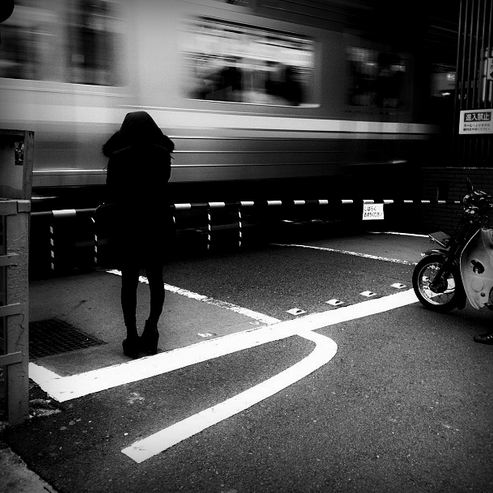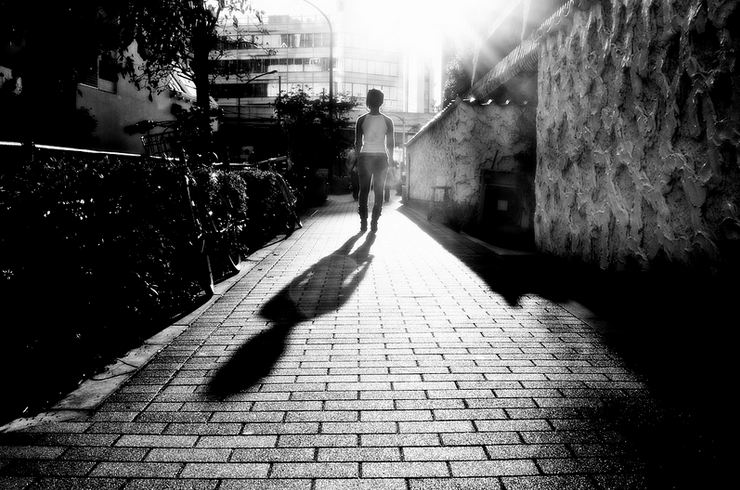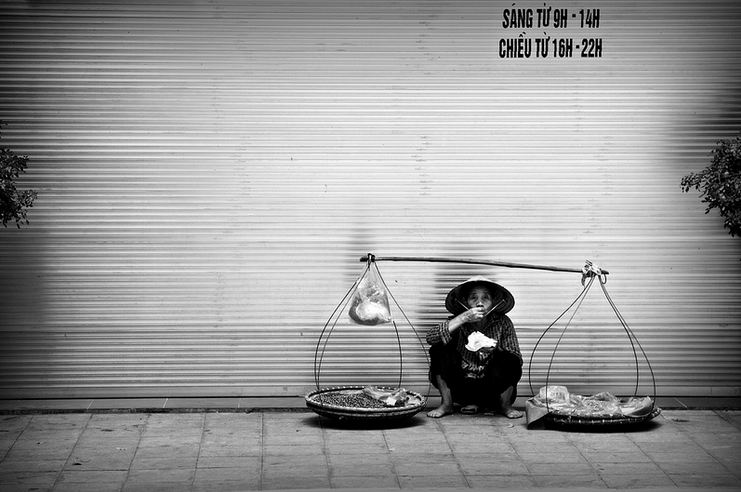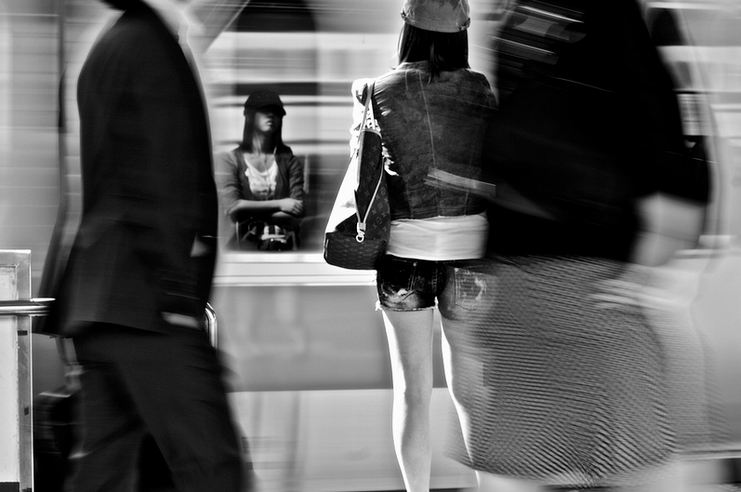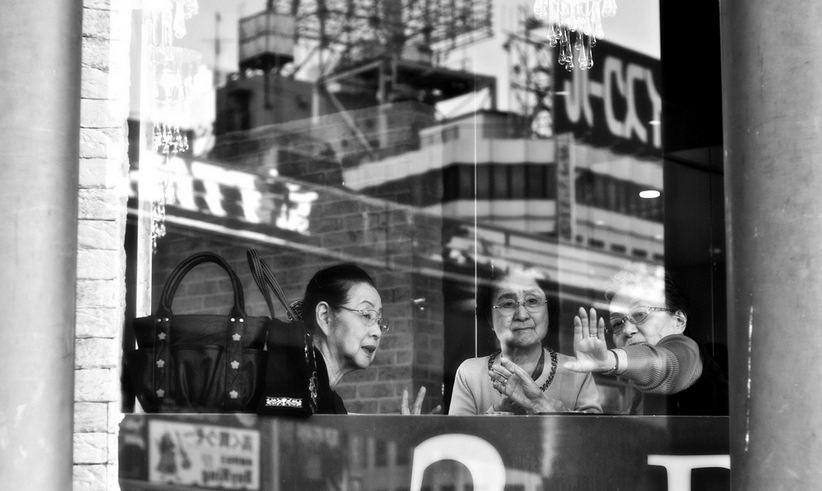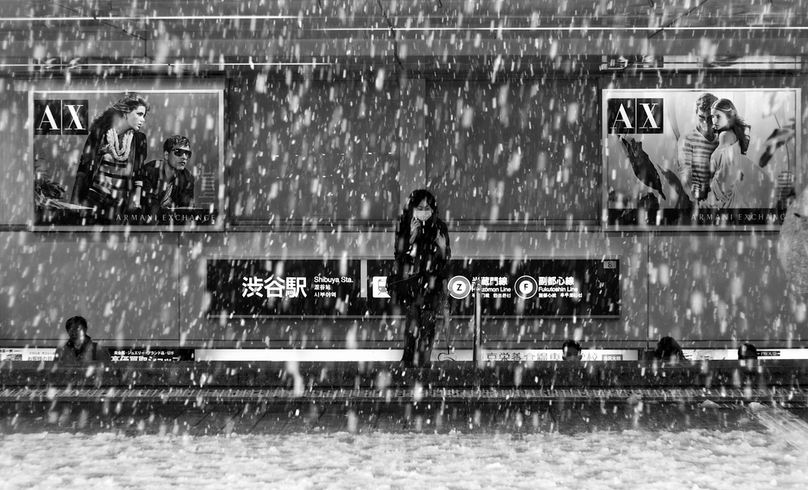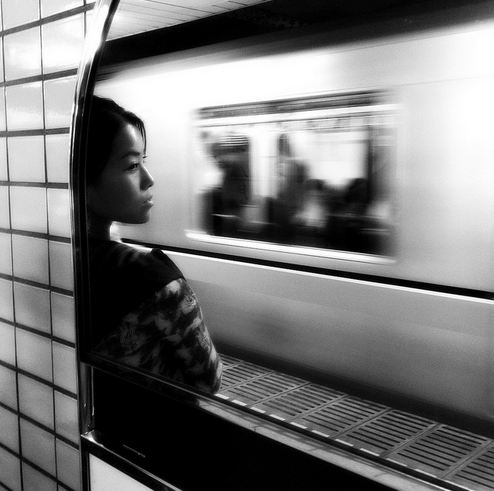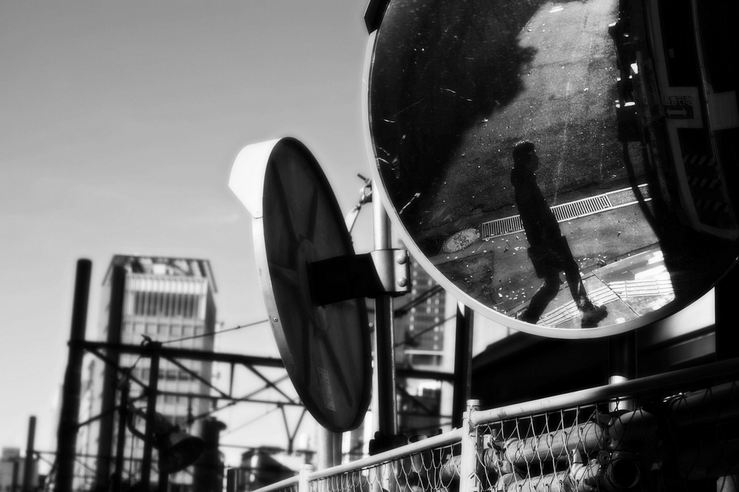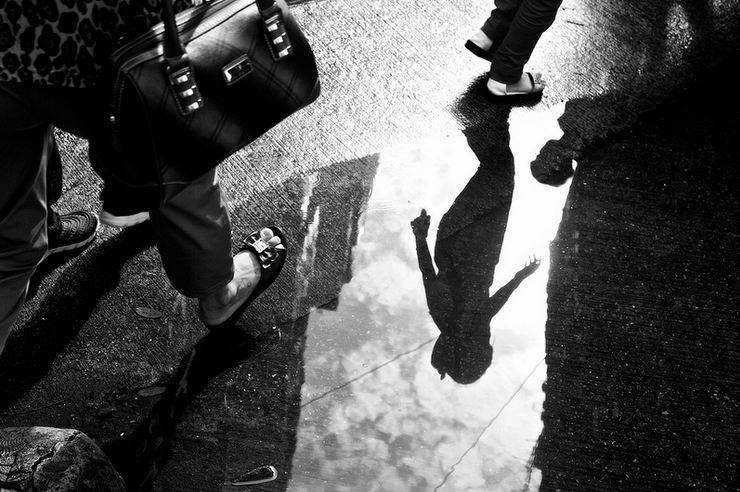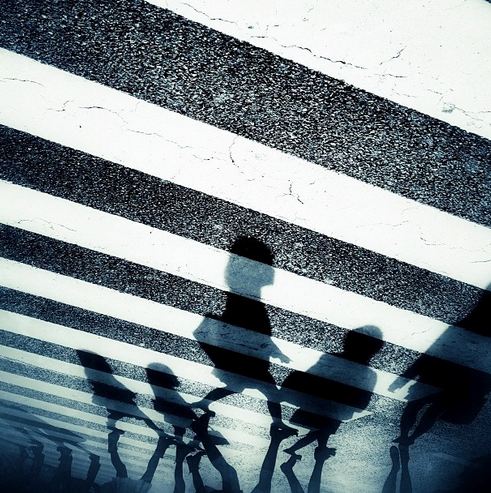11
2016
How did you discover photography? Tell us a little bit about yourself and your influences.
I discovered photography in different separated times. At first at school during Tuesday morning workshops but I think it was too early for me and I stopped. After it was with my father’s home laboratory that fascinated me so.
At school or with my dad I was stunned by the magic of appearance.
Late after I had a lover, war reporter, who taught me basics of sliver photography. Finally I had my first numerical camera two or three years after this relationship ended.
What does photography mean to you?
Something I don’t care a lot about. For me, photography is just a tool, not a goal. I don’t feel like being a photographer, despite the fact that I’m a professional one. I don’t work with a technical approach, I work with feelings and intuition. I mix plastic staging and social testimony to create something else. Something between.
How do you find inspiration?
Most of the time, directly from people I meet. Or from locations I discover, it can be right after the next corner but suddenly I fall in love with a wall, a door or a ground… But human being is always the first step.
Which style of photography do you like the most, and why?
I love the most sincere photography, and especially respectful of people involved inside. It’s totally subjective because I don’t know how was made this series or another, but it’s a very precise alchemy I dive in.
What is the one most important lesson that you have learned since you started taking photographs?
That loosing control is our best friend.
When you look at a photograph, how do you decide if it is a ´good´ piece of work? Unfortunately I don’t have the recipe of what I consider a good photography but from my experiment the best part is when I don’t have any questions about it and that something obvious is in front of me. When it happens that’s really joyous.
What was the most challenging photograph that you have ever taken, and why?
Physically for my series “8-The Line”, I climb a mountain with my model (skyliner) to shoot him base-jumping. I was fixed by professional equipment to a strong tree but most of my body was floating in the air and I had a few seconds to get the unique jump despite my uncomfortable position. I must admit that the photography is a little bit blurry but I accept it this way. Psychologically, the work I did in Django gypsie community during one year was not really easy, especially because for them I was the stranger.
What goal are you working towards within your photography and when will you know that you have reached it?
My goal is to show something in a different way that we got used to see that thing. I reach this goal for example when a person contacts me to tell me something about one of my photographs that I’ve not seen myself. He/she gives me another key to understand my self work.
What projects are you currently working on?
I’m finishing my big series “ColèresS Planquées” almost done and I’m still working in jail, giving art workshops to prisoners.
Looking at your own work, which piece is your favourite? Why? Please provide a link to the picture.
As you can imagine, it’s terrible to choose one picture… At first because time goes from series to series, but I choose one from my actual series “ColèresS Planquées” https://www.facebook.com/DorothyShoes/photos/pb.53369720882.-2207520000.1459500631./10153835317280883/?type=3&theater
Now, getting more technical, what equipment (e.g. camera body, lens, filters, flash, tripod, cleaning equipment, etc.,) do you use?
Nikon D300 / Lens Nikon 24-70 f 2:8.
What do you like/dislike about your equipment, specifically your camera, and how would you improve it?
The weight of my lens ! So heavy for me…
What lens do you use the most? Why?
I only use my 24-70mm because I really don’t need others for my kind of use.
What photographic equipment would you like to own and why?
I have really all what I need.
What would be the perfect piece of photographic equipment that doesn´t exist yet?
The same as mine but lighter.
When you travel, what is in your essential photographic kit bag?
My iphone. Yes, I don’t bring my camera during my travels, except if photo-working is the purpose of travel.
What kind of software/tools do you use for post-processing, if any? How long do you spend on this process? Tell us a bit about your workflow.
I use only photoshop for contrasts, curves, colors. It can be very quick like 20 minutes but can be much more like long hours.
Are there any photography websites that you visit regularly?
The Eye Of Photography.
Finally, what other interesting photographers would you like to see in this blog?
http://www.guillaumemartial.fr/ is my last heart-stopper.
Dorothy Shoes Photography
www.dorothy-shoes.com /
www.facebook.com/dorothy-shoes /
http://www.hanslucas.com/dshoes/photo
23
2014What kind of equipment (camera body, lens, filters, flash, tripod, cleaning equipment other) do you use?
As for my Digital equipment I use Nikon D700, Lens: 24mm 35mm 50mm and 85mm. My analog equipment consists of a Yashica T5.
What do you like and dislike about your equipment, specially your camera, and how would you improve it?
My Yashica T5 is perfect for various occasions. I like the fast autofocus and sharp Carl Zeiss T* Tessar 3,5/35 lens. I would not change the camera for any other analog camera.
My digital equipment could use an uprade. I still love my camera but working with better equipment I can notice the difference from average grade and professional. As for lenses, they are all D Lenses basically consumer average grade lens. If I could I would get all the Nikon Gold series lens in the same mm (24, 35, 50, and 85 also a 24-70) I also wouldn’t mind upgrading my Body for a D800 if I somehow came across $10,000 to spare. For now I can do anything I want with what I have and I am quite content with my current equipment.
What is your favorite lens, and why?
Hands down the 35mm. Why? Why not! I think for my kind of work it gives me the perfect balance. I am not one who captures close up portraits too often and generally prefer a little distance to capture a moment. The 35mm is perfect for just that.
When you travel, what is in your essential photographic kit bag?
Simple, D700 with my 35mm, 32GB memory card and my T5 with two or three rolls of film.
What kind of software/tools do you use for post-processing, if any?
I like Light Room quite a bit, to be honest I’ve been hooked on it lately, before I used to use only Photoshop and its curves adjustments. Eventually I discovered camera raw and I started to do more work on the raw files. Now I have moved on to Light room which is my primary software at the moment. I don’t do any extreme editing on Photoshop or Lightroom, but I am obsessed with colors and Lightroom provides a variety of fixed color edits/options.
How long have you been taking photographs? How do you find inspiration? How do you take your pictures?
I have been taking photographs for about 3 years now and find inspiration from movies and other artists.
I’m not sure how exactly to describe how I take pictures… since what I do is documentary photography you kind of just have to feel it out.
Which style of photography do you like the most, and why?
I am in love with documentary photography. I am fascinated by being able to capture moments that I share with my friends without them being posed. To me documentary photography has this sense of realism that makes it inviting and interesting to the viewer.
What goal are you working towards within your photography and when will you know you have reached it?
Hmm… not sure really right now, I am trying to finish a book based on a road trip I did with my friends across the U.S. driving by van from New York to Los Angelos. As for goals with my photography I just want to keep making photos that encourages others to travel and discover more of this wonderful world. I don’t think my “Goal” has an ending since I think there is not real ending to discovering places and sharing experiences with others.
Looking at your own work, which piece is your favorite? Why? Please provide a link to the picture.
I don’t really have a favorite photograph but this one that evokes many memories:
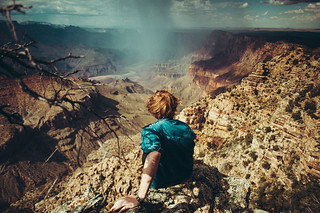
The reason why I love this picture so much is because we happen to be exploring the Grand Canyon and trekked to an area were we were not allowed and got an amazing view of the storm that was approaching us. To me life is about this discovering the beauty this earth has to offer us and this picture is an embodiment of what I stand for.
Does your work fit into any one or more distinct genres (nature, landscape, long-exposure, black-and-white, infra-red, urban, artistic, macro, vintage, vernacular, social, street)? If other, please specify.
I think my work is Lifestyle-Documentary. I don’t plan what I photograph I just have adventures with my friends and photograph those moments with them.
Are there any photography websites that you visit regularly?
Well I am always on tumblr looking at many other artists work, from illustrations to sculptures, I really enjoy viewing the creativity of others in various mediums. I also lovehttp://bewaremag.com/en they don’t just post photographic work but other various art mediums.
What is the one most important lesson that you have learned since you started taking photographs?
I think the most important lesson is to understand your work and learn from your mistakes. No one starts off knowing how to do anything; we all take time to learn. It takes time to improve but in order to improve we must understand fully what we are doing. To know how everything works and how to achieve that look or colors that we want. Many people ask me what camera I use and to be honest the camera is not what makes the photograph. Yes it helps but what many people don’t understand is that a camera is just a tool to make what you want. For example many people ask me what film camera I use but the real question should be what film do I use. The camera is just a body but the film and the lens are what makes the image look how it does along with understanding the light around you etc. For digital cameras now a days are quite similar and you can do the same with any digital camera once you know how the camera functions. Post-editing is where the real magic happens because we must edit a digital file in order to shape how we want it to look but again it goes back to understanding the techniques, lights, composition, and how to edit with the various soft wears that are available to us. Learning from my “mistakes” and how to improve my work is what has allowed me to do what I do now, so go out and try to understand how the film works and how to edit in digital and you will see your work improve!
Emmanuel Rosario Photography
Blog: http://emmanuel-rosario.blogspot.fr/
Facebook: https://www.facebook.com/Emmanuel.Rosario.Photography
Flickr: http://www.flickr.com/photos/emmanuelrosario/
Tumblr: http://emmanuel-rosario.tumblr.com/
14
2014
What kind of equipment (camera body, lens, filters, flash, tripod, cleaning equipment other) do you use?
I use a D700 and a D300s camera. Because of the different subjects I work on, I have to possess some different lenses such as a 24mm f/2,8, 35mm f/2, 50mm f/1,4, 85mm f/1,8 and some zoom lenses like a 24-70mm f/2.8 and 70-200mm f/2.8. I also use a tripod especially for night pictures. No filters, no flash, only natural light except for some fashion shootings.
I also use a photo bag (of course) and good mountain shoes!
What do you like and dislike about your equipment, specially your camera, and how would you improve it?
I use the D700 almost every time. Even if it’s getting older slowly compared to new DSLR, it’s still a very good FX camera. However, it happens sometimes that some pictures are more difficult to do than I would because of the AF and the high ISO noise rendering. Otherwise, this camera is perfect and I use it for 5 years now. A D4 is probably coming in a couple of month to replace it or to replace my D300s.
What is your favourite lens, and why?
Once again, that depends of the subject. For landscapes, my 50mm (yes, my 50mm) is really cool and so is my 24-70mm because it allows me to move my frame on the field when I can’t move myself. Plus, it’s stabilized. I’m not really a “zoom fan” but sometimes, you can’t avoid it.
For fashion and portraits, My 50mm and 85mm are really cool. When you get closer with a 50mm, it can deform a face while a 85mm keeps the things natural.
When you travel, what is in your essential photographic kit bag?
For mountains and other wild expeditions, I carry my 24-70mm and 70-200, my tripod, some compact flash cards, food and my flask.
What kind of software/tools do you use for post-processing, if any?
I only use Lightoom.
How long have you been taking photographs? How do you find inspiration? How do you take your pictures?
I started photography when I was 27 in 2007. I never touched a DSLR before so it’s been more than 6 years now.
I wanted to take picture of Nature (landscape, lights, atmosphere). Even more, I wanted to capture my own nostalgia with the forests. Nature guided my trough photography and humans keep me in to tell stories with pictures and texts.
I don’t have any secrets in the way I take pictures. I just form a line from the subject and the suggestion I put on it. You know when it works, always.
Which style of photography do you like the most, and why?
I would say a style that makes you going beyond the scene to find your happiness, no matter the subject is, no matter if it’s in sadness, nostalgia, pure happiness or more.
What goal are you working towards within your photography and when will you know you have reached it?
I probably won’t reach it… I simply try to exist through me. Photography, such as writing, is just a way to do it, even if it’s my job.
Looking at your own work, which piece is your favourite? Why? Please provide a link to the picture.
Definitely this one, from the series Sylkho : http://www.yohanterraza.com/sylkho#4 because so many people believed it was the Moon whereas it’s actually the Sun. This pictures was called “This is not the Moon” and, in my opinion, people gave it that name. I like the fact that photography is definitely NOT the really and won’t ever be.
Does your work fit into any one or more distinct genres (nature, landscape, long-exposure, black-and-white, infra-red, urban, artistic, macro, vintage, vernacular, social, street)? If other, please specify.
One day, I was working as an assistant for Cyrille Weiner, a great architecture photographer, who told me that a photographer should be able the take pictures of anything. The only link between my different subjects, is my artistic evolution’s vision. I could say I’m a landscape photographer, a human or social photographer or even a fashion photographer, but the reality is I’m a photographer. That’s it.
Are there any photography websites that you visit regularly?
I look at “Show me your Pictures”, “La boite verte”, or all the photographers I’ve subscribed on Facebook and Tweeter. Usually I visit art website, not specially photography website.
What is the one most important lesson that you have learned since you started taking photographs?
Patience becomes smile, smile becomes light, light is the subject.
And finally, what other interesting photographers would you like to see in this blog?
Sylvain Norget for his fantastic portraiture work, Constant Formé-Bècherat for his live concert pictures and his project about travelling on his own in Iceland, François Constant for his street photography film work, Cindy Jeannon for her vision of Nature and her positivity in loneliness in the wild which I’m totally agree with, Alexandre Deschaumes for his amazing mountain landscape work, and many more. All this people are real photographers, but all this people are travelers first.
Yohan Terraza Photography
http://www.yohanterraza.com/accueil
https://www.facebook.com/yophotographer?fref=ts
27
2014
What kind of equipment (camera body, lens, filters, flash, tripod, cleaning equipment other) do you use?
I use the Nikon D600 and a bunch of prime lenses, the 35mm 1.4, 50mm 1.4 and the 85mm 1.8.
What do you like and dislike about your equipment, specially your camera, and how would you improve it?
I’d like to not blame my camera, but if there was something I would like to change is for Nikon to go back to the d700 body for the d600. They were definitely more comfortable to hold and use.
What is your favourite lens, and why?
Right now it has to be the Sigma 35mm 1.4. If I had to pack just one lens in my bag it would be this one, it is the perfect length for me, it is just about wide and close at the same time. Also, the quality of the glass is amazing and the spot on quick focussing abilities make it perfect for me.
When you travel, what is in your essential photographic kit bag?
Like I said now I can complete my travel gear with just that one lens. Else I would carry a tele and a wide angle lens. Along with my tripod and the grad ND filter.
What kind of software/tools do you use for post-processing, if any?
I use Lightroom and Photoshop.
How long have you been taking photographs? How do you find inspiration? How do you take your pictures?
I have been taking photographs since 2005. It has been an every day activity and I have rarely thought about the why and how of the process. It has been instinctive and hope it continues to remains so.
Which style of photography do you like the most, and why?
I love portraiture and surrealism. The mix of two is the style I like best.
What goal are you working towards within your photography and when will you know you have reached it?
Someday I would like to work with Nat geo and however sinister this sounds I would like to document war.
Looking at your own work, which piece is your favourite? Why? Please provide a link to the picture.
There are two photographs that would definitely make my list of personal favourites, one happened by chance and the other after lot of planning.
http://www.flickr.com/photos/varun/4294741565/
http://www.flickr.com/photos/varun/9392898840/
Does your work fit into any one or more distinct genres (nature, landscape, long-exposure, black-and-white, infra-red, urban, artistic, macro, vintage, vernacular, social, street)? If other, please specify.
I do not know how to label my work. It is a photograph and the viewer can label it however they like it.
Are there any photography websites that you visit regularly?
500px, 1x and Flickr.
What is the one most important lesson that you have learned since you started taking photographs?
It has definitely made me more sensitive to the world around ( the real and the ones I make in my head)
And finally, what other interesting photographers would you like to see in this blog?
Ishita Singh has a beautiful fine-art portfolio and Richa Kashelkar for how simplistically she can show the soul of person or a place through her pictures.
Varun Suresh Photography
https://www.facebook.com/shotstoriesbyvarunsuresh
06
2014
What kind of equipment (camera body, lens, filters, flash, tripod, cleaning equipment other) do you use?
I use a Nikon D600 with Nikon prime lenses (28mm,50mm and 85mm). I like to use remote flash (SB700) with softbox (Lastolite).
I like everything in my camera. I’m very happy with it and I don’t have any plans to change it soon.
I always use prime lenses, maybe the 50mm is my favourite. I like to get close for my photos and I think the zoom is not necessary for me. I am the zoom.
When I travel I always bring some extra batteries and memory cards. Of course I’ll carry my camera, lenses,flash, tripods and softbox. This is a lot of weight for my shoulders but it’s worth it!
What kind of software/tools do you use for post-processing, if any?
I use Adobe Lightroom to edit the raw files. I finish the post-processing in photoshop, but not always.
How long have you been taking photographs? How do you find inspiration?
I’ve been taking photos for ten years. My inspiration started with travels. First with traditional travels with sightseeing but soon I realized that what inspired me in travels and photography was the people.
How do you take your pictures?Which style of photography do you like the most, and why?
What I enjoy most is taking portraits. If I have the time, I like to meet the person, have a little chat and the when we both are comfortable prepare the settings and shot!
What goal are you working towards within your photography and when will you know you have reached it?
I have my own career as software consultant and developer. I don’t have a clear goal with photography, I just keep moving forward.
Looking at your own work, which piece is your favourite? Why? Please provide a linkto the picture.
http://bit.ly/18m9sFq It’s called “Ready for a new day”, I took in Varanasi a special place for me. I wanted to make that photo, so I strolled down the ghats of the Ganges until the moment appeared in front of me.
Does your work fit into any one or more distinct genres (nature, landscape, long-exposure, black-and-white, infra-red, urban, artistic, macro, vintage, vernacular, social, street)? If other, please specify.
In the last years I’ve been more into portrait photography but I love street photography.
Are there any photography websites that you visit regularly?
Sometime I read photographic blogs but it’s very difficult to find good articles, so I prefer to read a good book or follow my favourite photographers on social networks and learn from them.
What is the one most important lesson that you have learned since you started taking photographs?
Try with distinct genres and find the one you are comfortable with, improve it and enjoy.
And finally, what other interesting photographers would you like to see in this blog?
I recently found a contact in flickr and I was amazed but some of his photos. He knows how to creat a magic moment with light. http://www.flickr.com/people/
Sergio Carbajo Photography
13
2013Anca Cernoschi Photography
http://ancacernoschi.ro/works/
https://www.facebook.com/AncaCernoschiPhotography
What kind of equipment (camera body, lens, filters, flash, tripod, cleaning equipment other) do you use?
I mostly use film cameras, 35mm and medium format cameras but planning to try large format too. I use at this moment Pentax Asahi ES II with 50mm/1.8 and 135mm/2.8, lenses that I also use on digital cameras with an adapter (Nikon1 V1 and my first camera Pentax K10D)
What do you like and dislike about your equipment, specially your camera, and how would you improve it?
The price of the lenses usually but I use manual lenses instead so it turns out ok 🙂
What is your favourite lens, and why?
My favorite in the old Pentacon 135/2.8 lens, it has a special feel to it, i love it’s soft focus and bokeh.
When you travel, what is in your essential photographic kit bag?
I use only my Nikon1 kit with 10-30mm and 30-110mm.
What kind of software/tools do you use for post-processing, if any?
I am currently using software to process my images but my goal is to process them only in the darkroom.
How long have you been taking photographs? How do you find inspiration? How do you take your pictures?
I an photographic for 5 years on and off but I have been studying arts for 10 years now. I prefer domestic interiors because they give a feeling of authenticity to the image, I usually find inspiration in the things I read. I photograph things the way I’d like them to be seen by the others.
Which style of photography do you like the most, and why?
It’s the nude photography, for me the human body is the most interesting to work with, it gives you endless possibilities and it’s a challenge to photograph it in unusual ways.
What goal are you working towards within your photography and when will you know you have reached it?
At this moment the goal is to make every photo better than the previous one. On long term to make images that will be remembered.
Looking at your own work, which piece is your favorite? Why? Please provide a link to the picture.
My definitely favorite remains the ‘Vase’, a photo that i took on my birthday 3 years ago because it’s the closest to what my goal is in photography.
http://ancacernoschi.ro/photo/Stories_of_Life_1/
Does your work fit into any one or more distinct genres (nature, landscape, long-exposure, black-and-white, infra-red, urban, artistic, macro, vintage, vernacular, social, street)? If other, please specify.
I also enjoy street photography by my main body of work remains fine art nude photography.
Are there any photography websites that you visit regularly?
Yes, a few but I prefer to study the classics and read as much as possible because that’s where I find my inspiration.
What is the one most important lesson that you have learned since you started taking photographs?
That you must experiment in order to know what fits you.
And finally, what other interesting photographers would you like to see in this blog?
Oh, there are too many that I appreciate for their work in various fields of photography, I couldn’t name just a few.
18
2013Madhur Dhingra Photography
What kind of equipment (camera body, lens, filters, flash, tripod, cleaning equipment other) do you use?
Canon 5D Mark 2, 24-105 L f f4 ,70-200L f4, Medium Format:Mamiya RZ 67 , Elincrome Studio Flashes & Soft Boxes, Manfrotto tripod, Hoya & Cokin Filters.
What do you like and dislike about your equipment, specially your camera, and how would you improve it?
I like my Canon equipment as it is, there is nothing to complain about.
What is your favourite lens, and why?
I love working with my 24-105mm.It has overall wonderful optics.
When you travel, what is in your essential photographic kit bag?
My camera body, lenses, filters, tripod, etc.
What kind of software/tools do you use for post-processing, if any?
Photoshop.
How long have you been taking photographs? How do you find inspiration? How do you take your pictures?
15 YEARS. Playing with light both in studio and outdoors gives me a thrill. Shooting people and nature is what I love doing.
Which style of photography do you like the most, and why?
As far as studio work is concerned I love shooting product. My personal thrill comes from shooting people.
What goal are you working towards within your photography and when will you know you have reached it?
My goal is to one day shoot for National Geographic.
Looking at your own work, which piece is your favourite? Why? Please provide a link to the picture.
My favourites are the work that I have done with people in Ladakh and Banaras, both in colour and black & white, where I have managed to create some powerful images. You can see all my work on my website: www.madhurdhingra.com
Does your work fit into any one or more distinct genres (nature, landscape, long-exposure, black-and-white, infra-red, urban, artistic, macro, vintage, vernacular, social, street)? If other, please specify.
My work is related to product photography, nature, landscape, black & white, artistic, social, street.
Are there any photography websites that you visit regularly?
I keep seeing works of all good photographers.
What is the one most important lesson that you have learned since you started taking photographs?
To enjoy your photography and keep creating something new. Not to bother about recognition as it will definitely follow in due course of time.
11
2013Mosa’ab Elshamy Photography
https://www.facebook.com/mosaabelshamy
http://www.flickr.com/photos/mosaaberising/with/9508552545
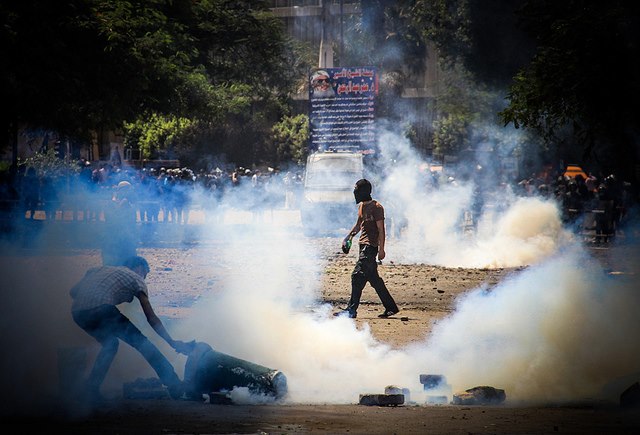
What kind of equipment (camera body, lens, filters, flash, tripod, cleaning equipment other) do you use?
I use a Canon EOS 60D. My 24mm f1.4 is my most precious possession and most used lens. I also use the 50mm f1.8 and, occasionally, a zoom lens.
What do you like and dislike about your equipment, specially your camera, and how would you improve it?
The 60D shoots really fast. With the 5.3 fps, it’s much faster than any camera I’ve used and that suits my work a lot, especially during street clashes where it takes less than a second! I think it could do better with auto focusing.
What is your favourite lens, and why?
Easily the Canon 24mm f1.4. Amazing sharpness, works great at night, and suits a lot of photography genres.
When you travel, what is in your essential photographic kit bag?
Same equipment I mentioned above.
What kind of software/tools do you use for post-processing, if any?
Lightroom.
How long have you been taking photographs? How do you find inspiration? How do you take your pictures?
I have been taking photographs since 2006. Back then I was interested in nature photography and, from time to time, I’d shoot some street work. When the Egyptian revolution broke out in early 2011, I found my inspiration and chased the protests with my camera. The turmoil since 2011 has gained me a lot of experience and photojournalism became my inspiration. I am always out on the street looking out for the humane sides in all the chaos. The turmoil has left everyone affected and there’s so much to capture.
Which style of photography do you like the most, and why?
Photojournalism fascinates me. Everything is out there, with no setup or meticulous planning required. But it requires a certain level of compassion and intimacy, of getting real close and finding the little stories that are often lost in the grand scheme of things. That’s a challenge I love and I am always after.
What goal are you working towards within your photography and when will you know you have reached it?
My goal is to make an impact with my photographs. As the violence grows and the circle of blood increases, humanity is being lost and many are turning to monsters. What I aim to is to try and stop that with the very little I have. It is very rewarding to hear that people have been touched by my photos and are becoming more compassionate towards the victims – who are many, and keep changing – rather than become apathetic.
Does your work fit into any one or more distinct genres (nature, landscape, long-exposure, black-and-white, infra-red, urban, artistic, macro, vintage, vernacular, social, street)? If other, please specify.
Photojournalism, social, and street.
Are there any photography websites that you visit regularly?
What is the one most important lesson that you have learned since you started taking photographs?
Compassion.
And finally, what other interesting photographers would you like to see in this blog?
LJ http://www.flickr.com/photos/16536699@N07/4953407235/
Lou O’bedlam http://www.flickr.com/photos/louobedlam/
Mahmoud Khaled https://www.facebook.com/mahmoudpix
30
2013Lukas Vasilikos Photography
http://www.lukasvasilikos.com/
http://www.street-photographers.com/author/lukas
http://lvasilikos.blogspot.com.es/
http://www.flickr.com/photos/vasilikos/
What kind of equipment (camera body, lens, filters, flash, tripod, cleaning equipment other) do you use?
I use canon 5d ii and an Olympus om-d5. I use 35mm on full frame body.
What is your favourite lens, and why?
My favorite lens is the 35mm fixed. I use it for long and it is so familiar to me that sometimes I know the frame that I will get even before I look through the viewfinder, I know what I will keep and what I will leave out of my photo. Having said that, I can decide if I will act to take the shot or not even when I just hold the camera in my hand in a relaxed manner.
When you travel, what is in your essential photographic kit bag?
My canon with 35mm lens and an Olympus om-d5 with a plastic holga lens 50mm.
What kind of software/tools do you use for post-processing, if any?
Lightroom 5 and then CS6 for final editing.
How long have you been taking photographs? How do you find inspiration? How do you take your pictures?
I discovered the world of photography through a course that I attended in 2006.My inspiration is from classic photographers and movies of Tarkovsky etc.
Which style of photography do you like the most, and why?
I like shooting in the streets, I like getting in touch with people unknown to me, I like the fact that I create a reality of “my own” through street photography. On the other hand, I am also attracted in shooting people familiar to me, trying to witness the emotional dialogue between the photographer and the subject. In this case I use a totally different technique than the one I use when I make street photography.
What goal are you working towards within your photography and when will you know you have reached it?
My primary goal is to enjoy the shooting process. Through photography I have been to places, I have met people, I have collected remarkable experiences. At a secondary stage there are many things I would like to achieve, however these things are part of the journey, they are not the journey itself. If we know where is our target point, then we also know when we have reached it.
Looking at your own work, which piece is your favourite? Why? Please provide a link to the picture.
I would say that the “uncanny” project is my favorite part. The reason is that this project is directly linked with my being, my beliefs and my experiences. It represents a constant dialogue between me and the world, or the way I fit in the world and it really makes me happy when I manage to make this very own dialogue a dialogue between me and the viewer.
Does your work fit into any one or more distinct genres (nature, landscape, long-exposure, black-and-white, infra-red, urban, artistic, macro, vintage, vernacular, social, street)? If other, please specify.
Street photography and something like personal documentary.
Are there any photography websites that you visit regularly?
I visit magnun photos and street-photographer.com a collective of some street photographer that I’m member.
What is the one most important lesson that you have learned since you started taking photographs?
I think that first of all learns to be patient. Apart from this, it’s to be alert all the time.
And finally, what other interesting photographers would you like to see in this blog?
http://www.flickr.com/photos/waxypoetic/
http://www.flickr.com/photos/p_wayser/
07
2013Michael Kistler Photography
https://www.facebook.com/pages/Urban-X/394888257206673?ref=hl
http://www.flickr.com/photos/mkistler/
http://findingyourselfinthestreets.com/
https://www.facebook.com/FindingYourselfInTheStreets?ref=hl
http://instagram.com/mdkistler/
What kind of equipment (camera body, lens, filters, flash, tripod, cleaning equipment other) do you use?
Body: Canon 7D
Lenses: Canon EF 24-105 mm f/4L/Canon 50 mm f/1.8/Tokina 11-16 mm f/2.8
iPhone 5
Ricoh GR
What do you like and dislike about your equipment, especially your camera, and how would you improve it?
There isn’t much I’d change with the 7D aside from the weight–it’s heavy, especially depending on the lens I’m using. I love my iPhone 5 for street–it’s easy, light and always with me. As for the Ricoh, the jury is still out–I’d read a lot of good things but thus far am not overly impressed.
What is your favourite lens, and why?
My favorite lens is my 50 mm 1.8. It’s simple, light, fast and functions well in low light. I also like that it forces me to interact when I’m shooting street.
When you travel, what is in your essential photographic kit bag?
I try to keep things as light as possible. I bring my Canon with the lenses mentioned above. If I’m shooting in an urban area with a concentration of tall buildings, I’ll also bring my wide angle lens. And, of course, my iPhone is always in my pocket.
What kind of software/tools do you use for post-processing, if any?
I don’t do extensive post-processing. Most of my editing involves minor tone-tweaking and contrast adjustments in Lightroom and Silver Efex/Color Efex Pro from Nik. I tend to do more editing of my iPhone shots and almost exclusively use Snapseed.
How long have you been taking photographs? How do you find inspiration? How do you take your pictures?
I’ve been shooting for 25 years, but my most focused (no pun intended!) work has been in the last 5 years. There is no end to motivation in the streets. I walk, shoot and inspiration seems to find me. I tend to shoot pretty freely and don’t get hung up on technical details. The essence of street photography is of the moment, so I have learned to react quickly to dynamic and fast-paced situations. The flip-side to missing the so-called decisive moment is that there will always be another one.
Which style of photography do you like the most, and why?
Street photography is my favorite because of the endless possibilities. I love the energy, movement, motion and interaction of various elements in a very unpredictable setting. I am also a big fan of motion blur and heavy contrast.
What goal are you working towards within your photography and when will you know you have reached it?
Personally, I am constantly striving to create better compositions and looking for new ways to express myself creatively. Additionally, I have devoted a lot of time recently to iPhone photography. There is something simple, free and unpretentious about it. I think the combination of the iPhone and Instagram has made photography a lot more fun and accessible to a wide range of people, which I think is a very positive direction for the future. I hope to be a part of it. Professionally, I have recently started a street photography workshop series (Finding Yourself in the Streets) with a friend and fellow photographer named Mimo Khair. It is my goal to do workshops throughout the world, increase the visibility of street photography as an art form and to connect with as many people as possible.
Looking at your own work, which piece is your favourite? Why? Please provide a link to the picture.
It’s tough to choose. There is something in photography about each photo being your next new favorite. That said, here is a recent personal favorite of mine. I shot this one on my iPhone, and I like that by simply rotating the image 180 degrees, the perception changes significantly. I think this image is complex in its simplicity if that makes any sense. There is a story here, but it is also very open to interpretation. Hopefully the image is thought-provoking to the viewer.
http://www.flickr.com/photos/mkistler/8645267976/
Does your work fit into any one or more distinct genres (nature, landscape, long-exposure, black-and-white, infra-red, urban, artistic, macro, vintage, vernacular, social, street)? If other, please specify.
I would characterize my work as street photography (mainly B&W but color, too), but there is often a distinctively abstract element to my images. I love imagery that is subjective and takes time to digest.
Are there any photography websites that you visit regularly?
Flickr
What is the one most important lesson that you have learned since you started taking photographs?
The single most important lesson I’ve learned is that what you see and how you compose is far more important than the camera and equipment you are using. Also, repetition is very important; if you want to be a good photographer you have to shoot, shoot, shoot.
And finally, what other interesting photographers would you like to see in this blog?
Brendan Ose and Mimo Khair are two of my favorites.
